法律英语综合教程归纳
法律英语知识点归纳
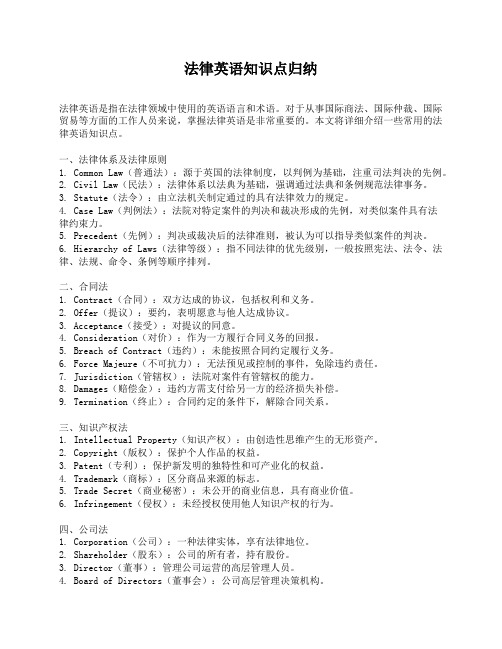
法律英语知识点归纳法律英语是指在法律领域中使用的英语语言和术语。
对于从事国际商法、国际仲裁、国际贸易等方面的工作人员来说,掌握法律英语是非常重要的。
本文将详细介绍一些常用的法律英语知识点。
一、法律体系及法律原则1. Common Law(普通法):源于英国的法律制度,以判例为基础,注重司法判决的先例。
2. Civil Law(民法):法律体系以法典为基础,强调通过法典和条例规范法律事务。
3. Statute(法令):由立法机关制定通过的具有法律效力的规定。
4. Case Law(判例法):法院对特定案件的判决和裁决形成的先例,对类似案件具有法律约束力。
5. Precedent(先例):判决或裁决后的法律准则,被认为可以指导类似案件的判决。
6. Hierarchy of Laws(法律等级):指不同法律的优先级别,一般按照宪法、法令、法律、法规、命令、条例等顺序排列。
二、合同法1. Contract(合同):双方达成的协议,包括权利和义务。
2. Offer(提议):要约,表明愿意与他人达成协议。
3. Acceptance(接受):对提议的同意。
4. Consideration(对价):作为一方履行合同义务的回报。
5. Breach of Contract(违约):未能按照合同约定履行义务。
6. Force Majeure(不可抗力):无法预见或控制的事件,免除违约责任。
7. Jurisdiction(管辖权):法院对案件有管辖权的能力。
8. Damages(赔偿金):违约方需支付给另一方的经济损失补偿。
9. Termination(终止):合同约定的条件下,解除合同关系。
三、知识产权法1. Intellectual Property(知识产权):由创造性思维产生的无形资产。
2. Copyright(版权):保护个人作品的权益。
3. Patent(专利):保护新发明的独特性和可产业化的权益。
4. Trademark(商标):区分商品来源的标志。
法律英语ppt复习总结
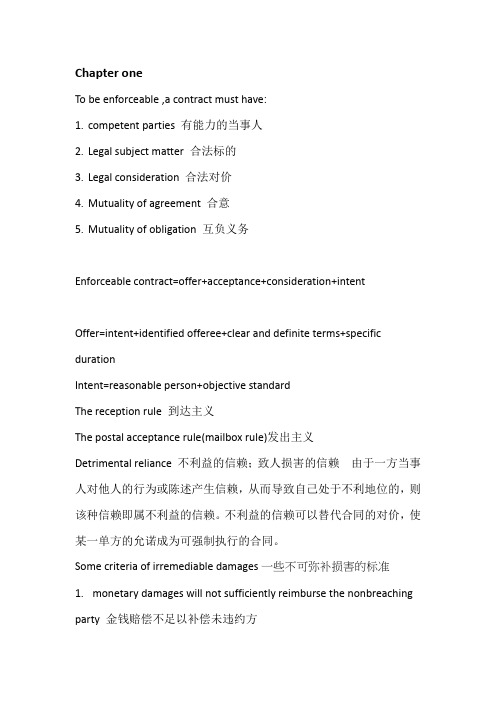
Chapter oneTo be enforceable ,a contract must have:petent parties 有能力的当事人2.Legal subject matter 合法标的3.Legal consideration 合法对价4.Mutuality of agreement 合意5.Mutuality of obligation 互负义务Enforceable contract=offer+acceptance+consideration+intentOffer=intent+identified offeree+clear and definite terms+specific durationIntent=reasonable person+objective standardThe reception rule 到达主义The postal acceptance rule(mailbox rule)发出主义Detrimental reliance 不利益的信赖;致人损害的信赖由于一方当事人对他人的行为或陈述产生信赖,从而导致自己处于不利地位的,则该种信赖即属不利益的信赖。
不利益的信赖可以替代合同的对价,使某一单方的允诺成为可强制执行的合同。
Some criteria of irremediable damages一些不可弥补损害的标准1.monetary damages will not sufficiently reimburse the nonbreaching party 金钱赔偿不足以补偿未违约方2.The contract was for personal services unobtainable elsewhere这是一份别处无法获得的个人服务合同3.The property/service is rare or unique财产或者服务是罕见的或者唯一的4.The balance of the hardship to both parties has been considered双方都考虑到履约和损失的平衡性Additional terms in acceptance or affirmation1.a definite and seasonable expression of acceptance or a written confirmation which is sent within a reasonable time operates as an acceptance even though it states terms additional to or different from those offered or agreed upon ,unless acceptance is expressly made conditional on assent to the additional or different terms.一个明确和合理的承诺的表达或者书面的确认书在合理的时间内作为承诺发出,即使它表述额外的条款或者不同于要约或者所商定的,除非承诺是明确附加了条件对于那些附加条款或者不同条款。
法律英语翻译课程总结
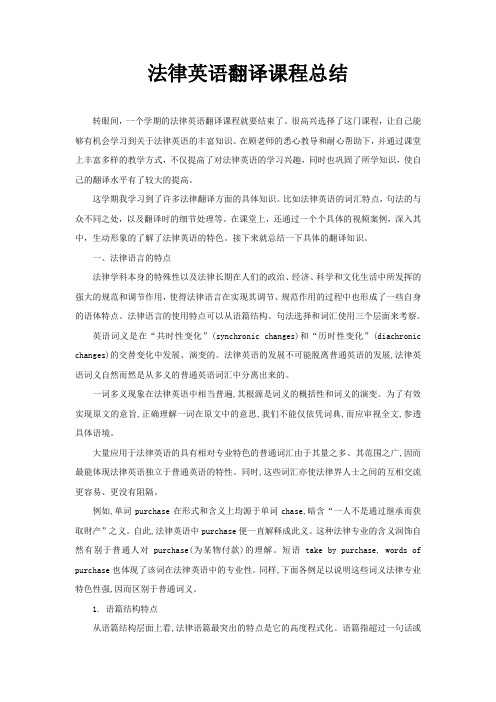
法律英语翻译课程总结转眼间,一个学期的法律英语翻译课程就要结束了。
很高兴选择了这门课程,让自己能够有机会学习到关于法律英语的丰富知识。
在顾老师的悉心教导和耐心帮助下,并通过课堂上丰富多样的教学方式,不仅提高了对法律英语的学习兴趣,同时也巩固了所学知识,使自己的翻译水平有了较大的提高。
这学期我学习到了许多法律翻译方面的具体知识。
比如法律英语的词汇特点,句法的与众不同之处,以及翻译时的细节处理等。
在课堂上,还通过一个个具体的视频案例,深入其中,生动形象的了解了法律英语的特色。
接下来就总结一下具体的翻译知识。
一、法律语言的特点法律学科本身的特殊性以及法律长期在人们的政治、经济、科学和文化生活中所发挥的强大的规范和调节作用,使得法律语言在实现其调节、规范作用的过程中也形成了一些自身的语体特点。
法律语言的使用特点可以从语篇结构、句法选择和词汇使用三个层面来考察。
英语词义是在“共时性变化”(synchronic changes)和“历时性变化”(diachronic changes)的交替变化中发展、演变的。
法律英语的发展不可能脱离普通英语的发展,法律英语词义自然而然是从多义的普通英语词汇中分离出来的。
一词多义现象在法律英语中相当普遍,其根源是词义的概括性和词义的演变。
为了有效实现原文的意旨,正确理解一词在原文中的意思,我们不能仅依凭词典,而应审视全文,参透具体语境。
大量应用于法律英语的具有相对专业特色的普通词汇由于其量之多、其范围之广,因而最能体现法律英语独立于普通英语的特性。
同时,这些词汇亦使法律界人士之间的互相交流更容易、更没有阻隔。
例如,单词purchase在形式和含义上均源于单词chase,暗含“一人不是通过继承而获取财产”之义。
自此,法律英语中purchase便一直解释成此义。
这种法律专业的含义润饰自然有别于普通人对purchase(为某物付款)的理解。
短语take by purchase, words of purchase也体现了该词在法律英语中的专业性。
法律英语常用词汇和句型总结

法律英语常用词汇和句型总结常用术语总结一、基本概念及用法债权人:obligee债务人:obligor一方:one party对方\相对人:the other party;善意相对人:the other party in good faith债权:creditor’s right; right to performance; right债务/义务: obligation标的物:subject matter责任:liability要约:offer;承诺:acceptance;要约邀请:invitation to offer;要约人:offeror受要约人:offeree收件人:recipient代理人:agent被代理人/本人:principle行为人:person performing (such) act代理权:agency authority应当:shall可以:may不能:may not不正当:improperly有权做. . .:may; is entitled to do履行义务:perform obligation, render performance订立合同:enter into a contract; conclude a contract; form acontract带来损失:cause loss to . . .损害利益:harm somebody’s interest赔偿损失:indemnify the other party for its loss由某人承担费用:expenses shall be borne by sb.承担损害赔偿责任:be liable for damages各自承担相应的责任:bear their respective liabilities accordingly要求承担违约责任:hold . . . liable for breach of contract享有权利、承担义务:assume right and obligation二、各个条文中的术语合同订立采取. . .方式: a contract is concluded by the exchange of. . .(e.g. by the exchange of an offer and an acceptance; by the exchange of electronic messages). . .的意思表示:manifestation of intention to do something 做出表示:manifest his intention (to do)接受履行:accept the performance订立合同时:in the course of concluding/ negotiating a contract; at the time of its conclusion 符合...规定:meet the requirement of . . .承诺的撤回:withdrawal of acceptance书面形式:in writing合同书形式:memorandum of contract具有本法. . .条规定的情形:fall into any of the circumstances set forth in Article. . .撤回:withdraw; 撤销:cancel拒绝追认:decline; 拒绝履行:reject受约束:be bound;is binding upon somebody表明:indicate价目表:price list拍卖公告:announcement of auction招标公告:call for tender招股说明书:prospectus商业广告:commercial advertisement数据电文:electronic message指定特定系统:designate a specific system快速通讯方式:instantaneous communication device国家指令性任务或国家订货任务:state mandatory plan or state purchase order根据需要/要求:in light of its requirement格式条款:standard terms条款:provision提请注意义务:duty to call attention应. . .要求,做. . .:do something upon the request of . . .与对方协商:negotiate with the other party预先拟定:prepare in advance重复使用:repeated use提供格式条款一方:the party supplying standard terms免除或限制责任:exclude or limit liability加重对方责任:increase the liabilities of the other party排除对方主要权利:deprive the other party of material rights 合理的方式:in a reasonable manner对格式条款的理解:construction of standard term通常理解:common sense不一致:discrepancy between… and …解释:interpret缔约过失责任:pre-contract liabilities恶意磋商:negotiate in bad faith以. . .名义:under the pretext of隐瞒与. . .有关的重要事实:conceal material facts relating to . . .提供虚假情况:supply false information商业秘密:trade secret泄露或不正当使用商业秘密:disclose or improperly use trade secret在订立合同的过程中获悉:become aware of in the course of negotiating a contract生效条件:conditions precedent解除条件:conditions subsequent阻止/促成条件成立:impair/facility satisfaction of a condition对合同的效力约定附条件:prescribe that the effectiveness of a contract be subject to certain conditions附生效/解除条件的合同:a contract subject to condition precedent/subsequent条件成立:condition is satisfied附期限的合同:contract term生效/失效期限:a time of commencement/expiration限制民事行为能力人:a person with limited capacity for civil act法定代理人:legal agent追认:ratify纯获利益的合同:a contract from which such person accrues benefits only与其年龄、智力、精神健康状况相适应:be appropriate for his age, intelligence, mental health催告法定代理人在一个月内予以追认:demand legal agent to ratify the contract within one month视为拒绝追认:is deemed to decline ratify the contract撤销的权利:somebody is entitled to cancel. . .以通知的方式做出:be effected by notification以. . .的名义:on one’s behalf没有代理权:lack agency authority超越代理权:act beyond his agency authority代理权终止:agency authority is extinguished请求人民法院或仲裁机构变更或撤销:petition the People’s court or an arbitration institution for amendment or cancellation 重大误解:material mistake显失公平:grossly unconscionable欺诈:fraud胁迫:duress乘人之危:take advantage of the other party’s hardship真实意思:true intention受损害方:aggrieved party合同无效、被撤销或者终止:invalidity, cancellation or discharge of a contract不影响. . .条款的效力:not impair the validity of the contract provision concerning. . .争议解决方法:the method of dispute resolution返还财产:make restitution of property过错方:the party at fault折价补偿:allowance be made in money based on the value of the property在合同约定的交付期间:during the prescribed period of delivery交付时的价格:price of delivery迟延交付标的物/提取标的物/付款:delay in delivering the subject matter; delay in taking delivery; delay in making payment 同时履行: simultaneous performance互负债务:owe performance toward each other没有先后履行顺序:there is no order of performance履行不符合约定:render non-conforming performance拒绝其相应的履行要求: reject its corresponding requirement for performance部分履行:partial performance债务人部分履行给债权人增加的费用:additional expenses incurred by obligee due to obligor’s partial performance 代位权:subrogation怠于行使到期债权:delay in exercising its creditor’s right that was due专属于. . .人本身:exclusively personal to somebody转让债权:assign a right受让人取得与债权有关的从权利:assignee assumes any incidental right associated with the obligee’s right让与人与受让人:assignor, assignee接到. . . 通知:upon receipt of notice of assignment债务人可以向受让人主张抵销:the obligor may avail itself of any set-off against the assignee对某人享有债权:have right to performance by/against somebody合并/分立:a party has effected combination/division合并/分立后的法人:legal person resulting from combination/division行使合同权利,履行合同义务:assume the rights and obligations享有连带债权,承担连带债务:jointly and severally assume the rights and obligations合同解除:terminate合同终止:discharge债务互相抵销:obligations were set off against each other将标的物提存:place the subject matter in escrow免除债务:release the obligor from performance毁损、灭失的风险:the risk of damage or loss孳息:fruits of subject matter违约责任:liabilities for breach of contract履行合同义务:perform obligations under a contract符合约定的履行合同义务:perform obligations in accordance with the contract; render conforming performance继续履行:specific performance采取补救措施:cure of non-conforming performance赔偿损失:payment of damages预期违约:anticipatory breach明确表示:expressly state行为表明:indicate by conduct违约金:liquidated damage一定数额:a certain sum/amount of …根据违约情况:in the light of degree of breach因违约产生的损失赔偿额的计算方法:a method for calculation of damages for the loss resulting from a party’s breach.适当减少:decrease the amount as appropriate公平原则:the principle of fairness诚实信用原则:the principle of good faith三、“效力”的词汇. . .的效力:effectiveness/validity of . . .e.g. effectiveness of contract/offer生效:become effective失效:extinguish有效:valid无效:invalid四、时间的词汇到达时间:time of arrival承诺期限:the period for acceptance信件载明的日期或电报交发之日:date shown on the letter or the date on which the telegram is handed in for dispatch 邮戳日期:the posting date stamped on the envelop超过承诺期间:after expiration of the period for acceptance 履行期限:time of performance. . .期间自…开始计算:the period for. . . commences on the date when. . ./once . . .五、常用句型:●A符合B情况的,视为C:A is deemed as C, if B.●表示假设,用”where” or ”if”●如果是个长句子,内容为:在一个大前提A下,又有几个不同的条件(B、C),每个条件下的结果(D是B的结果,E是C的结果)都不同。
法律英语汇总
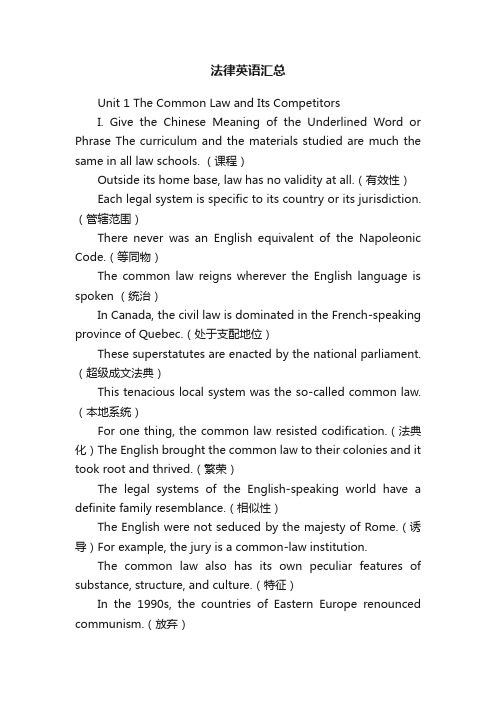
法律英语汇总Unit 1 The Common Law and Its CompetitorsI. Give the Chinese Meaning of the Underlined Word or Phrase The curriculum and the materials studied are much the same in all law schools. (课程)Outside its home base, law has no validity at all.(有效性)Each legal system is specific to its country or its jurisdiction.(管辖范围)There never was an English equivalent of the Napoleonic Code.(等同物)The common law reigns wherever the English language is spoken (统治)In Canada, the civil law is dominated in the French-speaking province of Quebec.(处于支配地位)These superstatutes are enacted by the national parliament.(超级成文法典)This tenacious local system was the so-called common law.(本地系统)For one thing, the common law resisted codification.(法典化)The English brought the common law to their colonies and it took root and thrived.(繁荣)The legal systems of the English-speaking world have a definite family resemblance.(相似性)The English were not seduced by the majesty of Rome.(诱导)For example, the jury is a common-law institution.The common law also has its own peculiar features of substance, structure, and culture.(特征)In the 1990s, the countries of Eastern Europe renounced communism.(放弃)Lawyers in Mexico work in the private sector and are not employees of the government.(部门)In general, it is a fairly crude business to assign legal systems to this or that family.(粗制的)We have to remember that a legal system is not an exercise in history.(一成不变)II. Fill in Each Blank with a Proper Word or Phrase Given BelowA law student usually studies the law of a single country. 一名法科学生同城会学习单个国家的法律。
法律英语-课件内容重点摘录整理
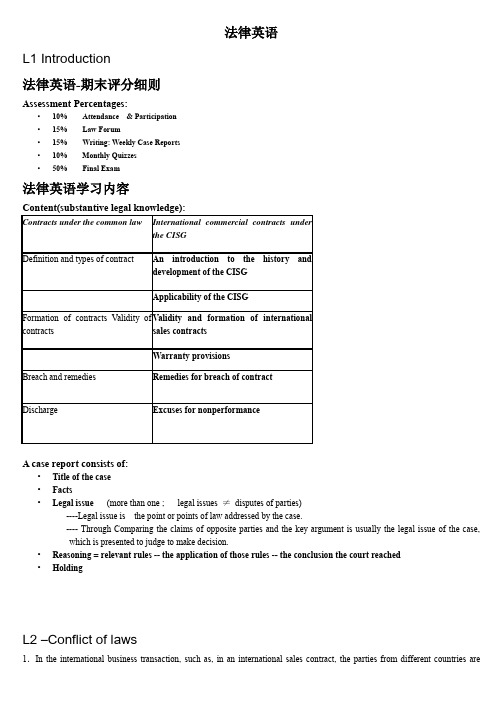
法律英语L1 Introduction法律英语-期末评分细则Assessment Percentages:•10% Attendance & Participation•15% Law Forum•15% Writing: Weekly Case Reports•10% Monthly Quizzes•50% Final Exam法律英语学习内容A case report consists of:•Title of the case•Facts•Legal issue (more than one ; legal issues ≠disputes of parties)----Legal issue is the point or points of law addressed by the case.---- Through Comparing the claims of opposite parties and the key argument is usually the legal issue of the case,which is presented to judge to make decision.•Reasoning = relevant rules -- the application of those rules -- the conclusion the court reached•HoldingL2–Conflict of laws1.In the international business transaction, such as, in an international sales contract, the parties from different countries areinvolved, and the contracting place may be different from the place of performance. If there arises dispute, what matters must the parties concern with?----Which country’s law will apply to the contract?----Where will the case be heard?2.To know what law applies to a contract, court will resort to conflict of law rules.( conflict of law is the area of law of each legal system which regulates how to deal with cases involving a foreign factor.)But application of conflict of law rules may bring about uncertainty and lack of predictability over how the case will be resolved, thus increase the risk of an international sale.3.To avoid uncertainty and unpredictability of conflict of law, many international contracts designate the parties’ cho ice of law which is to apply in case of dispute. That is, according to the rule of autonomy of the (party’s) will, the parties agree upo n which law will govern a contract and make a choice of law clause in their contract.4.the CISGL3 - History and Development of the CISGHow to deal with contract disputes in international transactions?----Where should the case be heard?----Which law should be the applicable law of the case?1. Autonomy of parties’ willWhen contract parties specify the choice of law and choice of forum, courts in most countries will require the parties to honor their contractual commitment.2. Conflicts of law3. The CISG✷About the CISG (p110 chapter4)1. Which organization drafted the CISG, UNIDROIT or UNCITRAL?2. W hat’s the main difference between the CISG and the other codes made by the UN?3. How did the CISG become the U.S. law?.✷T or F statements1. T --Treaties prevail over state statutes in the U.S..2. T -- The CISG prevails over the UCC.CISG (federal law)UCC (state statutes)PART ISPHERE OF APPLICATION AND GENERAL PROVISIONS(适用范围和准则)Chapter ISPHERE OF APPLICATIONArticle 1(1) This Convention applies to contracts of sale of goods between parties whose places of business are in different States:(a) when the States are Contracting States; or(b) when the rules of private international law lead to the application of the law of a Contracting State.(2) The fact that the parties have their places of business in different States is to be disregarded whenever this fact does not appear either from the contract or from any dealings between, or from information disclosed by, the parties at any time before or at the conclusion of the contract.(3) Neither the nationality of the parties nor the civil or commercial character of the parties or of the contract is to be taken intoconsideration in determining the application of this Convention.✷There are three conditions if The CISG is applicable:a -the commercial sale of goods;b- between two parties whose places of business are in different countries c-the places of business are located in countries that have ratified the convention.(How to decide “place of business”?)Article 2This Convention does not apply to sales:(a) of goods bought for personal, family or household use, unless the seller, at any time before or at the conclusion of the contract, neither knew nor ought to have known that the goods were bought for any such use;(b) by auction;(c) on execution or otherwise by authority of law;(d) of stocks, shares, investment securities, negotiable instruments or money;(e) of ships, vessels, hovercraft or aircraft;(f) of electricity.✷What sales are excluded from the CISG? And why? L4 –ContractPart1. A General Introduction to Contract⏹definition of a contractA contract is an agreement between competent parties based on the genuine assent of the parties, which is supportedby consideration and made for a lawful objective and in the form required by law, if any.⏹The basic requirements of a valid contract1. Agreement/genuine assent (a meeting of minds)2. Valid consideration----mutual promise3. Formation (offer + acceptance = contract)4. Capacity of parties to make a contract5. The legality of purpose or object of contract6. The form of contract must conform to the legal requirementsA valid contract should include all these essential elements and meet all these requirements.⏹Classification of contractWritten or oral contractsBilateral or unilateral contractsExpress or implied contractsExecuted or executory contractsValid, void, voidable contracts(P98—P104 Fundamentals of Business Law)According to their enforceability and validity, contracts can be classified into the following ones:1 _ Valid contracts __ has the necessary contractual elements, which is enforceable and has legal binding force.2 _ void contracts __ is not a contract at all. It has no legal effect. No parties should be bound by it.3 _ voidable contracts __ is a valid contract except that one party is entitled to rescind it.⏹Typical contract provisionsDuties and obligationsRepresentations and warrantiesTermination clausesRemedy clausesArbitration clausesPart2. Validity and Formation of International Sales Contracts (I)I. What does the CISG governII. Enforcement of illegal contractIII. The writing requirementIV. Problems of interpretationThe substantive study of the CISG( uniform code for the international contract of sale of goods)the CISG—balance : common law & civil lawI. What does the CISG govern? What is the CISG not concerned with? (Art. 4 ,5 & 11)⏹Only govern(1) Formation(2) Rights and obligations of the buyer and seller(3)The form of contract⏹Not govern(1) Validity(2) The property of the goods sold(3) Liability for death or personal injury caused by goods(4) Legal capacity of parties…II. Enforcement of illegal contractsContracts with illegal purposes have no legal effects. Such contracts are void and unenforceable.( Tarbert Trading, LTD. v. Cometals, Inc)III. The writing requirement (the form of the contract)1.The UCC (the 2003 proposed amendaments)2.The CISG3.Foreign Economic Contract Law of China (1985)4. New contract law of China (1999)Iv. Problems of Interpretation⏹Some general guiding principles of interpretation of contract:1. Plain English principle (the literal rule)2. The principle of four corners3. Types of writing --Handwritten words>Typed words>Printed words4. Standard form contractSuch contract is construed against the party who drafts it, otherwise exclusion clauses are construed against the party inserted them into the contract.5. Contracts affecting public interestsSuch contracts shall be construed in favor of the public.6. When one interpreter renders the contract valid and the other renders it invalid, the court usually adopt the one whichrenders the contract valid.7. Parol evidence rule(1) A. Where the parties have entered into a written sales contract that is intended to the final expression of the parties’agreement, the written agreement may not be contradicted by any prior agreement or contemporaneous oral agreement.( Where the sum payable is expressed in words and also in figures, and there is a discrepancy between the two,the sum denoted by the words is the amount payable.)B. Function of parol evidence:A. To clarify an ambiguityB. To prove additional terms of the agreement(2) Whether the CISG adopts the parol evidence rule?----No. Under the CISG in deciding the intend of the parties, all related circumstances may be considered. (Art. 8CISG)Whether the CISG allows to use parol evidence?----Yes. Under the CISG courts have wide leeway in using parol evidence in deciding the intend of the parties toa contract.8. In common law countries the courts often look to the past dealings of the parties and to trade usages for guidance ininterpreting contracts or filling the gaps.The CISG closely resembles the way trade usages are handled under American law. (Art.9 CISG)课堂Case analysis: Snow v. WinnFacts: A landlord sued his tenant in order to terminate the tenant’s lease. The landlord claimed the tenant hadbreached the lease agreement by using the premises for a convenience grocery store in violation of the“purpose clause” of the agreement. This clause stated that the tenant would use the premises for a gasolineservice station, car wash, and “associated activities”. The landlord alleged he had an oral understanding withthe tenant that the premises would not be used as a convenience store.Legal issue:Whether this oral testimony is admissible under the parol evidence?Reasoning:(1)The parol evidence rule states that…..(2) A.In this case, the parol evidence rule prohibits oral testimony about an integrated, written instrument.B. Furthermore, even if the phrase “associated activities” may be viewed as an ambiguity. Here the oraltestimony would be admissible to explain the meaning of such words.C. There was sufficient support for the court’s conclusion that retail gasoline operations are commonlyassociated with convenience store facilities and that parties intended to have good items sold on the premises.Decision: The court held this testimony was inadmissible.L5-8 Formation of ContractOffer + Acceptance = ContractPart1. OfferI.DefinitionsII. Basic elementsIII. Some problems about offerI.DefinitionsThe Common Law definition:An offer is a promise or commitment to perform or refrain from(制止)performing some specified act in the future.An offer must involve a definite promise by the offeror that he will bind himself if the exact terms specified by him are accepted.An offer may be made either to a particular person or to the public at large.The Chinese Law definition:An offer is a proposal with a view to entering into a contract with other parties. The proposal shall comply with the following stipulations:(1) Its contents shall be detailed and definite;(2) It indicates the intention of the offeror to be bound in case of acceptanceII. Basic elements = What are the basic elements to make an effective offer? P1161. Indicates or describes the goods;2. Expressly or implicitly specifies the quantity;3. Expressly or implicitly specifies the price for the goods.III. Some problems p1171. Public offerCan an offer addressed to the public (ads)?Different countries treat “public offer” differently:Germany— advertisements addressed to the public in general are mere invitations to deal.要约邀请the United States & China— do recognize specific advertisement that describe the goods、quantity、price my beconsidered an offerCISG— an advertisement or circular is not an offer unless the contrary is clearly indicated by the person making the proposal.2. Open price termIf the proposal is not definite enough, such as, no definite price terms, can it be taken as an offer? Yes, it can.(How to deal with “open price terms” in different legal systems?)CISG—look to the trade or to the market price of comparable goods to make its own determination of price, and all its other provisions will remain in effect. Art.553. Firm offersHow does the UCC define firm offer?–not be revoked if it is made in a signed writing or record that gives assurance that it will remain open for astated period of time , not to exceed three months.How does the CISG define firm offer-- firm offer are valid even if they are not in writing. Moreover, an offer may not be revoked if the offeree reasonably relies on the offer as being irrevocable and the offeree has acted in reliance on the offer.4. To withdraw an offer(1)How to withdraw the offer legally?(2)Whether an irrevocable offer can be withdrawn? Yes. Though irrevocable, may be withdrawn if the withdrawalreaches the offeree before or at the same time as the offer. ( Art.15)5. To revoke an offer(1) Suppose an offer has reached the offeree, but the offeror still wants to cancel it. How should he do?The revocation reaches the offeree before he has dispatched an acceptance. (Art.16)(2) Under what circumstances can an offer not be revoked?a. if it indicates, whether by stating a fixed time for acceptance or otherwise, that it is irrevocable; orb. if it was reasonable for the offeree to rely on the offer as being irrevocable and the offeree has acted inreliance on the offer.6. To terminate an offerAn offer, even if it is irrevocable, is terminated when a rejection reaches the offeror. -- Article 17True or False statements1.An offer becomes effective when the offeror dispatches it towards offeree.F- an offer become effective when reaches the offeree2.Before the offer reaches the offeree, it can be revoked by the offeror at will.F- two kind of exceptions –(Art.16)a b.3.An irrevocable offer cannot be withdrawn.F - Though irrevocable, may be withdrawn if the withdrawal reaches the offeree before or at the sametime as the offer. (Art.15)4. Even if an offer is irrevocable, it may be withdrawn.. T5. After an of fer reaches the offeree, it’s unlikely to make it invalid. FPart2. Acceptance⏹DefinitionAcceptance is a voluntary act (either words or conduct) by the offeree that shows assent (agreement) to the terms of an offer. The acceptance must be unequivocal(不含糊) and must be communicated to the offeror.⏹How to make a valid acceptance?Article 18(1) A statement made by or other conduct of the offeree indicating assent to an offer is an acceptance. Silence or inactivity does not in itselfamount to acceptance.(2) An acceptance of an offer becomes effective at the moment the indication of assent reaches the offeror. An acceptance is not effective if theindication of assent does not reach the offeror within the time he has fixed or, if no time is fixed, within a reasonable time, due account being taken of the circumstances of the transaction, including the rapidity of the means of communication employed by the offeror. An oral offer must beaccepted immediately unless the circumstances indicate otherwise.(3) However, if, by virtue of the offer or as a result of practices which the parties have established between themselves or of usage, the offereemay indicate assent by performing an act, such as one relating to the dispatch of the goods or payment of the price, without notice to the offeror, the acceptance is effective at the moment the act is performed, provided that the act is performed within the period of time laid down in thepreceding paragraph.True or FalseA makes an offer to B.1. B is not interest ed, but B’s friend, C, accepts the offer. Then a contract is concluded.F --Who can accept? ----I. the person to whom the offer is made. II. His agents2. Offeree says, “I accept the offer, but I wish I could have gotten a better price.” So there is an effective acceptance. F–虚拟语气表过去希望,但已不可能实现3. The offeree says, “I accept the offer, but only if I can pay on ninety days’ credit. Then this is a valid acceptance.F – It is a counter offer4. The offeree replies, “I accept; please send written contract.” This should be take n as an acceptance. ?5. The offeree replies, “I accept if you send a written contract.” This should be taken as an acceptance.?6.It is reasonable for the offeror to state, “By your silence and inaction you will be deemed to have accepted this offer.”-- Silence can never be an acceptance.(Silence can be an acceptance(1)when the parties have made such agreements(2)or (2) when the offeree has had prior dealings with the offeror.)CISG⏹D efinitionArticle 18.A statement made by or other conduct of the offeree indicating assent to an offer is an acceptance.⏹T hree basic elements to make a valid acceptance(1) Offeree (2) through a statement or other conduct (3) indication of assent to the offer⏹When the acceptance becomes effective?1. Under the common law, the acceptance becomes effective as soon as it is dispatched by the offeree, and then acontract is formed. ----the mailbox rule2. Under the civil law, the acceptance becomes effective when it reaches the offeror, and then a contract is concluded.----the rule of receipt of the letter of acceptance3. As to this point, CISG follows an approach somewhat different from the common law but similar to the civil law.----Article 18⏹CISG tries to compromise on two legal systemsCISG mainly adopts the approach of civil law, but it does absorb some elements of mailbox rule. – Art.16 / 18Art.18 An acceptance is effective when it reaches the offeror . ----receipt of acceptanceOne point which should be stressed is that offeree’s dispatch of an acceptance cuts off the offeror’s right to revoke the offer ----dispatch of acceptance⏹Whether a late acceptance is effective?1. There are two kinds of late acceptance.(1)The offeree makes an acceptance beyond the time limit for acceptance.That is, it is late when the offeree dispatches the acceptance.It is impossible for such acceptance to become effective except that without delay the offeror informs itseffectiveness.(2) The offeree dispatches the acceptance within the time limit for acceptance but the acceptance reaches theofferor beyond the time limit.That is, it is not late when the offeree dispatches the acceptance, and if its transmission had been normal, itwould have reached the offeror in due time.2. Such late acceptance is generally effective as an acceptance unless without delay the offeror informs the offereethat he considers his offer as having lapsed. ---- Art.21⏹Whether an acceptance can be withdrawn or revoked?CISG tries to achieve a balance in protecting the interests of two contracting parties.On one hand, CISG protects the interests of the offeror, who is entitled to withdraw or revoke the offer;On the other hand, CISG protects the interests of the offeree, who is also entitled to withdraw the acceptance.An offer may be revoked if the revocation reaches the offeree before he has dispatched an acceptance.The offeree’s dispatch of acceptances cuts off the offeror’s right to revoke the offer.⏹Whether a reply to an offer containing additional or different terms constitutes an acceptance?Material alteration: price, payment, quality and quantity of the goods, place and time of delivery, extent of one party’s liability to the other or the settlement of disputesCase analysis:A computer printer distributor in Argentina receives an offer by mail from Epson, a U.S. company, in reply toan inquiry. The offer arrives in Argentina on June 2. On June 12, the Argentinean company sends its acceptance by mail. On June 8, Epson sends a revocation of its offer that was received on June 13 in Argentina. The acceptance from Argentina arrives in the United States on June 17. Did a valid contract arise? When was the offer valid? When was the acceptance valid? When was the revocation valid? Decide the case under the common law and under the CISG.⏹Legal principles:1.An offer may be revoked if the revocation reaches the offeree before he has dispatched an acceptance.2.The offeree’s dispatch of acceptance cuts off the offeror’s right to revoke the offer.1. Mirror Image RuleThe rule requires that an offeree respond to an offer with an acceptance that is definite and unconditional, and that matches the terms of the offer exactly and unequivocally不含糊的.Most common-law and civil-law countries follow the mirror image rule. Under these laws, it is unlikely for an acceptance containing different or additional terms to become effective. Such acceptance is usually considered a counteroffer and thusa rejection of the original offer.2. The Battle of the FormsAs the mirror image rule requires that an acceptance be unconditional, both parties, buyer and seller, have to negotiate back and forth through standard business forms. The mirror image rule is the source of the battle of the forms.offer counteroffer counteroffer …The “last shot” principle:The form sent last in time will prevail others as the contract.3. Modification to Mirror Image RuleA. Modification under UCCB. Modification under the CISG----Art. 19C. Modification under China’s contract law---- Art.30, 31A -- Modification under UCCA. In the United States the mirror image rule has been changed by statute (the UCC) to deal with modern businesspractices.-- UCC 2-207(1) A written confirmation with additional or different terms operates as an acceptance unless…(It breaks the mirror image rule.)(2) Between merchants, an acceptance by a confirmation that contains new terms will produce a contract and newterms become a part of contract unless:The buyer (the offeror) expressly limits…The new terms materially alter…The buyer notifies the seller of an objection to the new termsB. How to deal with the additional or different terms(1)To become a part of the contractThe contract is concluded between merchants, containing those additional or different terms which only reflects minor differences (related to usual and customary usage in trade).(2) Not to become a part of the contractThe contract would arise without the new terms if the new terms reflect major differences( material alteration---- that is not commonly accepted in the trade and that would result in surprise hardship).B -- Modification under the CISG----Art. 191. The CISG compromises between the mirror image rule set out by the common and civil law and the UCC. Under theCISG:(1) the acceptance containing the new terms that do not materially alter the terms of the offer becomes a part of thecontract.---- close to the UCC(2) The purported acceptance containing the new terms that do materially alter the terms of the offer wouldconstitute a rejection of the offer and a counteroffer.---- close to the mirror image rule2. Unlike the UCC, the CISG goes further to define “material alteration” :T h e k e y e l e m e n t s t h a t w i l l m a t e r i a l l y a l t e r a c o n t r a c t: price, payment, quality and quantity of the goods, placeand time of delivery, extent of one party’s liability to the other or the settlement of disputesC -- China’s contract law---- Art.30, 31第三十条承诺的内容应当与要约的内容一致。
英语专业《综合教程》一、二册笔记整理
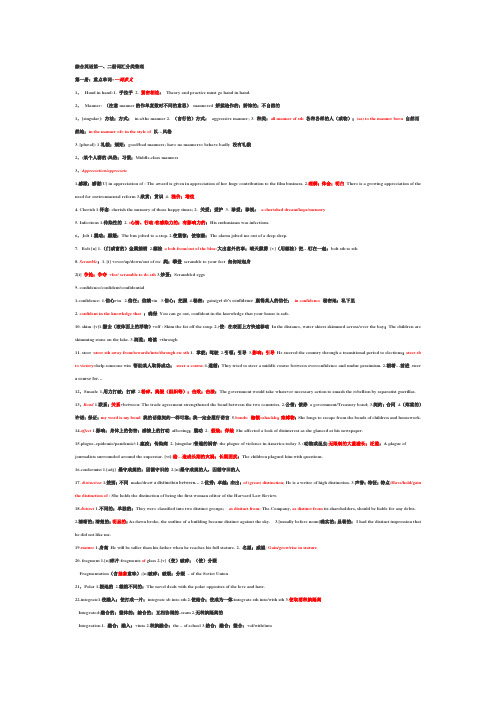
综合英语第一、二册词汇分类整理第一册:重点单词+一词多义1.Hand in hand:1. 手拉手2. 紧密相连:Theory and practice must go hand in hand.2.Manner: (注意manner的作单复数时不同的意思)mannered 矫揉造作的;矫饰的;不自然的1.[singular]: 方法;方式:in a/the manner 2. (言行的)方式:aggressive manner; 3. 种类:all manner of sth 各种各样的人(或物);(as) to the manner born自然而然地;in the manner of= in the style of以…风格3. [plural]: 1.礼貌;规矩:good/bad manners; have no manners= behave badly 没有礼貌2.(某个人群的)风俗;习惯;Middle-class manners3.Appreciation/appreciate1.感激;感谢[U] in appreciation of : The award is given in appreciation of her huge contribution to the film business.2.理解;体会;明白There is a growing appreciation of the need for environmental reform3.欣赏;赏识4. 涨价;增值4. Cherish 1.怀念: cherish the memory of those happy times; 2. 关爱;爱护3. 珍爱;珍视:a cherished dream/hope/memory5. Infectious 1.传染性的2. (心情、行动)有感染力的;有影响力的:His enthusiasm was infectious.6.Jolt 1.震动;颠簸:The bus jolted to a stop. 2.使震惊;使惊醒:The alarm jolted me out of a deep sleep.7. Bolt [n] 1.(门或窗的)金属插销2.螺栓a bolt from/out of the blue:大出意外的事;晴天霹雳[v](用螺栓)把…钉在一起:bolt sth to sth8. Scramble:1. [i] +over/up/down/out of etc 爬;攀登scramble to your feet 匆匆站起身2[i] 争抢;争夺+for/ scramble to do sth 3.炒蛋:Scrambled eggs9. confidence/confident/confidential1.confidence: 1.信心+in2.信任;信赖+in3.信心;把握4.秘密:gain/g et sb’s confidence 赢得某人的信任;in confidence秘密地;私下里2. confident in the knowledge that:确保You can go out, confident in the knowledge that your house is safe.10. skim :[v]1.撇去(液体面上的浮物)+off : Skim the fat off the soup. 2.(使) 在表面上方快速移动In the distance, water skiers skimmed across/over the bay;The children are skimming stone on the lake. 3.浏览;略读+through11. steer :steer sth away from/towards/into/through etc sth 1. 掌舵;驾驶2.引领;引导3.影响;引导He steered the country through a transitional period to elections;steer sb to victory=help someone win 帮助某人取得成功;steer a course:1.遵循:They tried to steer a middle course between overconfidence and undue pessimism. 2.朝着…前进steer a course for…12.Smash: 1.用力打破;打碎2.粉碎,捣毁(组织等);击败;击溃:The government would take whatever necessary action to smash the rebellion by separatist guerillas. 13.Bond 1.联系;关系+between: The trade agreement strengthened the bond between the two countries. 2.公债;债券a government/Treasury bond; 3.契约;合同4.(郑重的)许诺;保证:my word is my bond 我的话像契约一样可靠;我一定会履行诺言 5.bonds: 枷锁=shackle;束缚物:She longs to escape from the bonds of children and housework.14.affect 1.影响;身体上的伤害;感情上的打动affecting;震动2. 假装;佯装She affected a look of disinterest as she glanced at his newspaper.15.plague~epidemic/pandemic/:1.瘟疫;传染病2. [singular]普遍的祸害: the plague of violence in America today 3. (动物或昆虫)无限制的大量滋长;泛滥:A plague of journalists surrounded around the superstar. [vt]:给…造成长期的灾祸;长期困扰:The children plagued him with questions.16.conformist 1.[adj] 墨守成规的;因循守旧的2.[n]墨守成规的人,因循守旧的人17. distinction 1.差别;不同make/dra w a distinction between… 2.优秀;卓越;杰出:of (great) distinction; He is a writer of high distinction. 3.声誉;特征;特点;Have/hold/gain the distinction of : She holds the distinction of being the first woman editor of the Harvard Law Review.18.distinct 1.不同的;单独的:They were classified into two distinct groups; as distinct from: The Company, as distinct from its shareholders, should be liable for any debts. 2.清晰的;清楚的;明显的:As dawn broke, the outline of a building became distinct against the sky. 3.[usually before noun]确实的;显著的:I had the distinct impression that he did not like me.19.stature 1.身高He will be taller than his father when he reaches his full stature. 2. 名望;威望: Gain/grow/rise in stature20. fragment 1.[n]碎片:fragments of glass 2.[v](使)破碎;(使)分裂Fragmentation(含抽象意味);[n]破碎;破裂;分裂~ of the Soviet Union21.Polar 1.极地的2.截然不同的:The novel deals with the polar opposites of the love and hate.22.integrate1.使融入;使打成一片:integrate sb into sth 2.使结合;使成为一体:integrate sth into/with sth 3.使取消种族隔离Integrated:融合的;整体的;综合的;互相协调的~team 2.无种族隔离的Integration 1. 融合;融入:+into 2.种族融合:the ~ of school 3.结合;融合;整合:+of/with/intoIntegrity 1.正直;诚实:maintain/preserve your integrity; question/doubt sb’s integrity; professional/artistic/political integrity 2.完整;完全:defend the new state’s territori al integrity23.spectrum 1.系列;范围;幅度wide/broad spectrum=a large range: The course covers a wide spectrum of musical activity from opera to rock 2. 光谱3. 频率24.capacity 1.能力;:capacity to do/for sth;2.身份in a professional/personal/advisory etc capacity;in your capacity as :I attended in my capacity as chairman of the safety committee.3.容量;容积;容纳力1.The seating capacity of the theater is 5,000. 2.The hall was filled/full to capacity.25.discipline [n]1.纪律;惩罚:Impose discipline/maintain discipline 2.自控能力;自制力:Their attention wandered and they lacked the discipline to learn. 3.训练方法:Studyinga foreign language is a good discipline for mind. 4.(尤指大学的)学科;科目[v]1.惩罚;处罚:The strikers were disciplined by management. 2.discipline yourself:约束自己26.conscious:1.意识到;注意到~ of doing sth/~that 2.神志清醒的;有知觉的3.慎重的;有意的;刻意的~decision/effort 4.特别感兴趣的;关注的:Environmentally-conscious27.refine: 1. 精炼;提纯:refined sugar 2. 改善;改进;使精炼:refine one’s manners28.reflection;1. 映像:He admired his reflection in the mirror. 2. (声、光、热等的)反射3. 反映;显示;表达:The increase in crime is a sad reflection on(=shows sth bad about)our society. 4.沉思;深思;审慎的思考:She decided on reflection to accept his offer after all.29. induce : 1. 劝说;诱使induce sb to do sth 2.引起;导致=cause or produce, result in, bring about, entail : Drugs which induce sleep30. Persist 1. 顽强地坚持;执着地做~ in sth/in doing sth/with sth ; 2.维持;保持;持续;存在:If the pain persists, consult a doctor.31.Vision 1.视力;视野:good/perfect/poor/blurred/normal vision; 2.想象;幻想3. 想象力;眼力;远见卓识=foresight: a leader of foresight Visionary 1.有眼力的;远见卓识的2. 梦幻的;(尤指)宗教异象的;神示的32.Vain≈futile1. 徒劳的;枉然的;in the vain hope/in a vain attempt to do/in vain; 2.自负的;自视过高的: She is too vain to wear glasses.33. Given : 1.[adj]已经安排好的;规定的:They were to meet at a given time and place. Be given to sth/to doing sth: 经常做;习惯于;2.[prep]考虑到;鉴于Given his age, he is remarkably active. Given that: It was surprising the government was re-elected, given that they had raised taxes so much.34. moral [adj]1. 道德的:a moral issue/dilemma/question 2.道义上的;道德上的:moral responsibility/duty 3.品行端正的;有道德的4.能辨别是非的:Children are not naturally moral beings. Take/claim/seize the moral high ground声称自己的论点在道义上占优势[n]1.品行;道德2. 寓言:The moral of the fable is that honesty is always the best policy.35. scarcely [adv]1.几乎不:I can ~ believe what’s hap pened. 2.才;仅仅:We had~ driven a mile when the car broke down. 3.决不;一定不:I can scarcely refuse to help after all he’s done for me.36.conviction 1.定罪;判罪:previous conviction; 2.坚定的信仰;信念;3.深信;确信:lack conviction(缺乏信心);not carry conviction(没有说服力)37. nest 1.鸟巢2.+of 一套;一组: a nest of table38. off 1.离开;走开:be off/be off to; off/on course 偏离/在正确航线;航向2.从…(顶部或表面)离开:keep/stay off the grass 3.不上课;不工作;休息:be off 4.off and on/on and off 有时;间或;断断续续39.Distant 1. 在远处的:in the not too distant future:在不久的将来;Distant memory 遥远的记忆;the dim and distant past:很久以前;遥远的过去;Keep a respectful distance 敬而远之;2疏远的;不友好的;冷淡的; 3. 恍惚的;心不在焉的;4.远亲的;远房的 a distant relative40.somehow:1.以某种方法:somehow or other:不管怎么样;2.由于某种未知的原因41.Lean 1.清瘦而健康的;2.倚靠:lean against/on sth 3.有(选择或支持某事物的)倾向:lean in the direction of sth; lean on sb 依靠某人;leaning towards对…的倾向;爱好;偏爱42.Extend 1.提供;给予;(向某人)表示(欢迎、感谢、同情)extend sth to sth 2.涉及(范围;延伸(距离)延续(时间);Rain is expected to extend to all parts of the country. The desert extends for miles.Extension/extent: 1.This kidnapping shows an _extension_ of terrorist activity to innocent children. 2. This kidnapping shows the _extent_ of terrorist activity which has got innocent children involved.43. Identify: 1.indentify sb as sth:1.辨认;确认;2.是…的标志;显示出;2.identify with sb体会(某人)的思想感情;理解并同情(某人)的感受:He didn’t seem to be able to identify with ordinary people and their aspirations. 3.be identified with sb/sth把某人或某物联系在一起4.identify sth with sth 认为…和…一致;将…等同于44.ground [v]1.使飞机停飞;船只搁浅;2. 罚…呆在家里His parents grounded him for two weeks for smoking.3.使决定、想法建立在…之上,基于:be grounded in/on sth [n]4.理由;原因:on the grounds of: She is suing the company on the ground of unfair dismissal.45.sway [v]1.摇动;摇摆2.影响某人;使改变看法:Sway sb into doing sth 3.[n]hold sway :1.(对人们的观点或行为)有巨大的影响力;2.控制某个区域under sb’s sway:在某人的控制或统治下46.Smear:1.(胡乱地)涂,抹:be smeared with sth 2.玷污;诽谤:≈slur/smash/malign47.Facility 1.[通常用复数](房间、设备等)设施;2.(工具、制度等的)特点:Have the facility to do sth : The software has the facility to produce high-quality graphics displays.3.(用作某种用途的)区,大楼;4.[单数/U]天赋;技能;技巧:He has a facility for languages.[注]:facility作单数时指场所;作复数时指设施。
法律英语资料

Lesson One Legal systemPart one:Legal phrases1.Report (Law reports) 判例汇编:报道人reporter对于级别较高的法庭审理中的司法程序、案件事实陈述、当事人辩论、法庭判决及理由、法官的同意、反对意见等予以记载的出版物。
United States Reports 美国最高法院判例汇编2.United States Supreme Court / Supreme Court of the United States 联邦最高法院Chief Justice 首席大法官associate Justices大法官3.Case law : caselaw or case-law 判例法Case Law System 判例法系judge-made law法官造法Common law普通法local custom 地方习惯法statutory law /written law 制定法Anglo-American legal system英美法系civil law legal system/ continental law legal system大陆法系equity law横平法Chancellor’ court \ Equity’s court 衡平法院canon / church law教会法4.Writ令状Writs of right权利令状Prerogative Writs特权令状Original writs 诉讼开始令状Judicial writs司法令状Provision of Oxford 牛津条例Writ upon the Case个案条例5.stare decisis 遵循先例6.Court rules法院规则7.Direct sources 直接渊源Indirect sources 间接渊源8.Legal system 法律制度、法律体系9.Written constitution\ragid constitution 成文宪法/刚性宪法unwritten constitution\flexible constitution 不成文宪法/柔性宪法10.federal system 联邦制confeeral system邦联制11.itinerant judge巡回法官12.form of action诉讼形式13.Recourse to law诉诸法律14.jury trial\trial by jury陪审团审grand jury大陪审团lay people 外行bench trial法官审Verdict(award)陪审团的裁决General verdict 概括性裁断,即确定原告胜诉还是被告胜(civil cases);被告有罪还是无罪(criminal cases)Special verdict特别裁断(few special cases)陪审团仅对案件中的特定事项进行裁决,而将对该事实适用法律的问题留给法官解决Unanimous verdict 一致裁断Majority verdict 多数裁断15.Real property \real estate \immovable property不动产movable property 动产Part two: Legal SayingEquity saying:Equity corrects error .Equity corrects a law which is too board in that particular or in which it is defective .Equity doesn’t make the law , but assists the law .Equity acts in personam .Chancellor’s footLesson 2 Legal professionLesson 3 Legal EducationLesson4 Judicial SystemPart1:Legal Phrase:1.the Bar法律职业/律师职业Lawyer法律职业者2.ABA (American Bar Association )美国律师协会Attorney (counsellor)律师Attorney 检察官3.SJD (Doctor of Juridical Science)法学博士LLM(Master of Laws) 法学硕士JD (Juris Doctor) 法律博士Teaching methods :Lecture method , Case method ,Socratic methodTypes of lawyers in private practice :single practitioner / partnership / corporation4.House counsel/Corporate counsel 公司法律顾问5.independent counsel 独立检察官制度6.Double-track system双轨制court of appeals上诉法院trial court 审判法院/基层法院Federal district court 联邦地区法院Three-tiered model 三级模式7.Barrister(英)大律师solicitors(英)小律师Part 2:Uncomplimentary synonymsAmbulance chaserShysterPettifogger(pettifogging shyster)Philadelphia lawyerLegal eagleHired gunLip (mouthpiece)Part 3: Legal saying:saying: When the law is on your side, you pound on the law; when the facts is on your side ,you pound on the facts; when neither the law nor the facts is on your side , you pound on the table.Part 4: Court MovieTo killing a mocking bird, 1962 the Paper Chaser(1973)w(1980S)Movie:the practice(1990s)Lesson 5 ConstitutionPart1:Legal Phrase:1.Mayflower Compact五月花公约In the name of God, Amen.We whose names are underwritten, the loyal subjects of our dread sovereign Lord, King James, by the grace of God, of Great Britain, France and Ireland king, defender of the faith, etc., having undertaken, for the glory of God, and advancement of the Christian faith, and honor of our king and country, a voyage to plant .既是清教徒的自治公约,也是Plymouth殖民地的基本法规。
《法律英语综合教程》归纳

●法律的分类:A.Public law and private lawPubliclaw:constitutional law,criminallaw andadministrative law(行政法)Private law:contract law commercial lawtort law propertylaw…B.Criminal lawand Civil lawC.Civil law(大陆法)and CommonLaw(普通法)大陆法的重要特点是强调成文法的作用。
成文法(written law)又称为制定法(stat ute)Commonlaw(case law):following the principle ofstare decisis遵循先例●Goddessoflaw:希腊:TemisRoman:Justitia词汇:administrative agency 行政机关prosecutor检察官Damages:损害赔偿金punitive/exemplary damages 惩戒性损害赔偿金Lawsuit诉讼(尤指非刑事案件)instituea lawsuit提起法律诉讼MirandawaningsStatue of limitations诉讼时效是指民事权利受到侵害的权利人在法定的时效期间内不行使权利,当时效期间届满时,人民法院对权利人的权利不再进行保护的制度。
●Source of law:Constitutionsand common law (commonlaw) and statutory law and administrative lawstatutorylaw(legislation):制定法(立法)制定法是由国家享有立法权的机关依照法定程序制定和公布的法律。
●Chinese Court system:中国的人民法院的组织体系分为四级,即设基层、中级、高级和最高人民法院,并设军事、铁路、水运等专门人民法院。
法律英语教程宋雷知识点
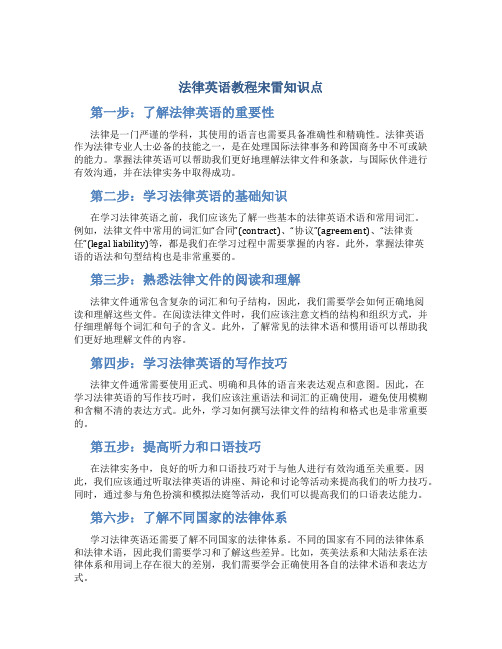
法律英语教程宋雷知识点第一步:了解法律英语的重要性法律是一门严谨的学科,其使用的语言也需要具备准确性和精确性。
法律英语作为法律专业人士必备的技能之一,是在处理国际法律事务和跨国商务中不可或缺的能力。
掌握法律英语可以帮助我们更好地理解法律文件和条款,与国际伙伴进行有效沟通,并在法律实务中取得成功。
第二步:学习法律英语的基础知识在学习法律英语之前,我们应该先了解一些基本的法律英语术语和常用词汇。
例如,法律文件中常用的词汇如“合同”(contract)、“协议”(agreement)、“法律责任”(legal liability)等,都是我们在学习过程中需要掌握的内容。
此外,掌握法律英语的语法和句型结构也是非常重要的。
第三步:熟悉法律文件的阅读和理解法律文件通常包含复杂的词汇和句子结构,因此,我们需要学会如何正确地阅读和理解这些文件。
在阅读法律文件时,我们应该注意文档的结构和组织方式,并仔细理解每个词汇和句子的含义。
此外,了解常见的法律术语和惯用语可以帮助我们更好地理解文件的内容。
第四步:学习法律英语的写作技巧法律文件通常需要使用正式、明确和具体的语言来表达观点和意图。
因此,在学习法律英语的写作技巧时,我们应该注重语法和词汇的正确使用,避免使用模糊和含糊不清的表达方式。
此外,学习如何撰写法律文件的结构和格式也是非常重要的。
第五步:提高听力和口语技巧在法律实务中,良好的听力和口语技巧对于与他人进行有效沟通至关重要。
因此,我们应该通过听取法律英语的讲座、辩论和讨论等活动来提高我们的听力技巧。
同时,通过参与角色扮演和模拟法庭等活动,我们可以提高我们的口语表达能力。
第六步:了解不同国家的法律体系学习法律英语还需要了解不同国家的法律体系。
不同的国家有不同的法律体系和法律术语,因此我们需要学习和了解这些差异。
比如,英美法系和大陆法系在法律体系和用词上存在很大的差别,我们需要学会正确使用各自的法律术语和表达方式。
第七步:实践法律英语技能最后,我们应该通过实践来巩固和提高我们的法律英语技能。
法律英语单词分单元汇总
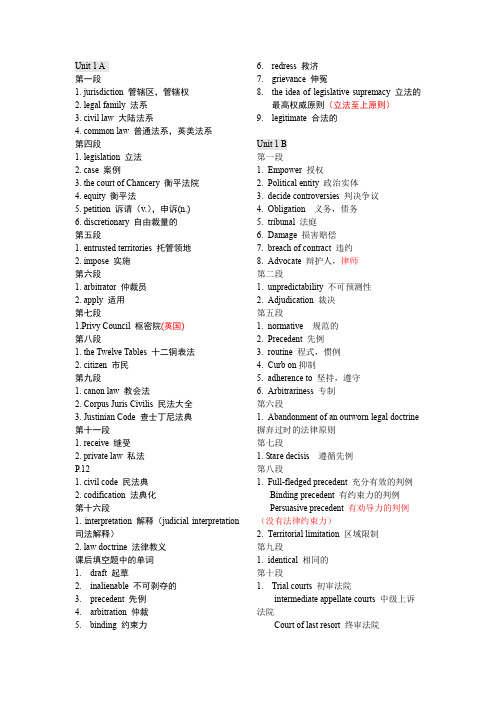
Unit 1 A第一段1. jurisdiction 管辖区,管辖权2. legal family 法系3. civil law 大陆法系4. common law 普通法系,英美法系第四段1. legislation 立法2. case 案例3. the court of Chancery 衡平法院4. equity 衡平法5. petition 诉请(v.),申诉(n.)6. discretionary 自由裁量的第五段1. entrusted territories 托管领地2. impose 实施第六段1. arbitrator 仲裁员2. apply 适用第七段1.Privy Council 枢密院(英国)第八段1. the Twelve Tables 十二铜表法2. citizen 市民第九段1. canon law 教会法2. Corpus Juris Civilis 民法大全3. Justinian Code 查士丁尼法典第十一段1. receive 继受2. private law 私法P.121. civil code 民法典2. codification 法典化第十六段1. interpretation 解释(judicial interpretation 司法解释)2. law doctrine 法律教义课后填空题中的单词1. draft 起草2. inalienable 不可剥夺的3. precedent 先例4. arbitration 仲裁5.binding 约束力6.redress 救济7.grievance 伸冤8.the idea of legislative supremacy 立法的最高权威原则(立法至上原则)9.legitimate 合法的Unit 1 B第一段1. Empower 授权2. Political entity 政治实体3. decide controversies 判决争议4. Obligation 义务,债务5. tribunal 法庭6. Damage 损害赔偿7. breach of contract 违约8. Advocate 辩护人,律师第二段1. unpredictability 不可预测性2. Adjudication 裁决第五段1. normative 规范的2. Precedent 先例3. routine 程式,惯例4. Curb on抑制5. adherence to 坚持,遵守6. Arbitrariness 专制第六段1. Abandonment of an outworn legal doctrine 摒弃过时的法律原则第七段1. Stare decisis遵循先例第八段1. Full-fledged precedent 充分有效的判例Binding precedent 有约束力的判例Persuasive precedent 有劝导力的判例(没有法律约束力)2. Territorial limitation 区域限制第九段1. identical 相同的第十段1.Trial courts 初审法院intermediate appellate courts 中级上诉法院Court of last resort 终审法院第十一段1. Rres judicata一案不再审2. Stare decisis先例约束3. Reversal 撤销overruling 推翻,否决第十二段:1.Plaintiff 原告defendant 被告第十八段1. render the decision 判决2. Holding 裁定3. dictum 意见(法官的附带意见)第十九段1. Persuasive authority 说服效力课后习题:1. Lessor 出租人lessee/tenant 租客,承租人Unit 2 A第一段1.nomenclature 系统命名法,命名court nomenclature 法院名称2.hierarchical 等级制度的hierarchical structure 层级结构3.court of last resort 终审法院第二段1.trial court ( the court in the first instance )初审法院2.court of inferior jurisdiction 有限管辖权的法院3.justice of the peace court 治安官法院4.municipal court 市政法院第三段1.court of general jurisdiction 一般管辖权的法院第四段1.superior court 高级法院2.district court 地区法院3.circuit court 巡回法院4.court of common pleas 普通诉讼法院5.justice 大法官judge 法官第五段1.appellate court (Court of Appeals )上诉法院2.supreme judicial court 最高审判法院3.supreme court of appeals 最高上诉法院4.tribunal 法庭5.merits 案件事实6.substantive law 实体法第六段1.day in court 出庭应诉,出庭答辩2.matter of grace 法外开恩,恩典3.existing statutes 现行成文法4.docket 诉讼事件表,案件排期表第七段1.discretion 自由裁量权2.screen out 筛选strain out 过滤第八段1.federal court 联邦法院2.interpretation 解释权3.enforcement 实施权第九段1.intermediate appellate court ( called the Court of Appeals )中级上诉法院2.Claims Court 索赔法院3.Tax Court 税务法院第十三段1.entertain 受理2.provision 条款3.diversity of citizenship 公民身份多样性第十四段1.venue 审判地(从数个有管辖权的法院中选出来的那个审判法院)forum 有管辖权的法院2.file a suit 提起诉讼(指民事起诉)第十五段1.actions at law 普通法诉讼2.cases in equity 衡平法案件3.promulgate 颁布,公布第十六段1.judicial circuit 巡回审判地区2.Court of Claims 索赔法院3.Court of Customs and Patent Appeals 海关与专利上诉法院第十七段1.en banc 全体法官听审2.summon 传召,传唤3.litigation 诉讼litigant 诉讼当事人第十八段1.petition 诉请,申诉2.writ 令状3.certiorari 调卷令4.discretion 自由裁量权第十九段1. umpire 裁判员Unit 3 B第一段1. The Supreme Court 最高法院2. Interpret the constitution 解释宪法3. Judicial review 司法审查4. Render decisions 做出判决第二段1. State legislature 州立法机关2. Federal administrative agency 联邦行政机构第三段1. Constitutional review 宪法审查2. Partisan politics 党派政治3. Justice of the peace 治安法官4. Vest 授予5. Ordain 任命6. Provision 规定7. Designate 指定指派8. Hierarchy 等级9. Jurisdiction 管辖权10.Hear 审理11.Provision 款12.Precedence 先例13.Consensus 一致同意14.Intrigue 阴谋15.Consolidate 巩固第四段1.Sectary of state 国务卿2.Affixing the seal 盖国玺3.Senate 参议院4.Inadvertence 不注意5.Inaugurate 开始任职6.Withhold 撤回第五段1. A writ of mandamus 执行令状第六段1. The executive branch 行政部门2. Dilemma 两难3. Acquiesce 默许第七段1. Ministerial detail内阁主张第八段1. Original jurisdiction 初审管辖权2. The judiciary act 司法法3. Tour de force 精心杰作4. Grant 授予5. Relief 救济6. Cede 放弃第九段1. V oid 无效2. Mandamus 执行令3. A government of limited powers 有限政府第十一段1. Judicial duty 司法责任第十二段1. Syllogism 三段论第十三段1. Logical rigor 逻辑严密性第十四段1. Criminal proceeding 刑诉2. Thwart 阻碍,反对3. Rescind 解除4. the supremacy clause 最高条款第十五段1. Tenure 任期第十六段1. Futility 徒劳无果而终2. Desegregate 废除种族隔离第十七段1. Executive privilege 行政特权课后1. Separation of powers 三权分立2. Administrative regulation行政规章3. Statutory instrument法定文书4. Veto否决5. Interpretation字面解释6. Construction上下文解释7. Federalism联邦制8. Statute法(特指)9. Act 法(泛指)10.Writ 文书11.Certiorari 移送命令调卷令12.Servitude 服役13.Bill 法案14.Administrative regulation 行政法规(美国的用法)15.Statutory instrument 法定文件(英国的行政法规用词)Unit 4 A第一段1. omission 疏忽,懈怠,不作为(negligence)2. Removal from public office 开除公职3. Disqualification from holding public office 剥夺政治权利4. Probation 缓刑5. Restitution 返还原物,恢复原状(monetary restitution 金钱赔偿)第二段1. Press charges、bring charges、bring a suit 、file a suit 提起诉讼第三段1. State prosecutor 州检察官2. Process the claim (claim=charge\suit)提起诉讼第五段1. Execution 执行死刑(capital punishment 死刑)(以下为老师上课补充)3. Punitive damages 惩罚性损害赔偿4. Exemplary damages 惩罚性损害赔偿5. Award 裁定损害赔偿金的判决(相当于sentence or make a judgment)第六段1. Assault 企图伤害罪2. Battery 殴击罪(assault and battery 殴击罪)第七段1. Apprehension 逮捕2. Miranda warnings 米兰达警告3. Probable cause 合理的根据第八段1. Felony 重罪2. Misdemeanor 轻罪3. Infraction 一般违法(相当于violation)第九段1. Transgression 违法2. Corroborative evidence 加强证据,实证证据,佐证3. Complaint 自诉起诉书4. Issuance of an arrest warrant 签发逮捕令第十段1. Involuntary manslaughter 非预谋故意杀人,过失杀人第十一段1. Motives 犯罪动机1. Intent 犯罪意图第十二段1. Strict liability 严格责任2. Acquittal 宣告无罪第十四段1. A first degree murder 一级谋杀2. Imbecile 低能者第十五段1. Mens rea 犯意2. Actus reus犯罪行为3. Causation 因果关系第十六段1. The grossly negligent behavior 重大过失行为第十七段Hold-up 抢劫课后练习单词1. Infamous crime 不名誉犯罪2. Infamy 声名狼藉3. Ineligible 不适铬4. Commence 开始(commencement 毕业典礼)5. Search or seizure 搜查或扣押6. Criminal sanction 刑事制裁7. Psychological pressure 心理压力8. Requisite 必备的,必不可少的9. Model Panel Code 模范刑法典Unit 5 B第一段1. Pretrial steps 审前程序第二段1. The bill of information 检察官公诉书2. Complaint 起诉书(针对misdemeanor)3. Law enforcement 执法,法律实施4. The subject matter 诉讼标的5. Magistrate 地方执法官6. Be bound over 具结(bound over for trail法官接受公诉书后,被告会受审)7. Misdemeanor 轻罪第三段1. The grand jury process 大陪审团程序2. Appearance 出庭3. Refute 驳斥4. Put on a defense 提出抗辩第四段1. The arrest 逮捕2. Take a suspect into custody 拘捕嫌疑犯3. Charge 指控4. Official arrest warrant 正式逮捕令5. Probable cause 合理根据第五段1. Booking 登记备案2. Inventory search 物品清查3. Contraband 违禁品4. Preliminary investigation 初步调查5. Seizure 扣押第六段1. The decision to prosecute (检察官)公诉决定第七段1. The initial appearance 首次出庭2. Constitutional rights and guarantees 宪法权利和保证3. Bail 保释金4. Nominal bail fee 名义担保费5. Released on one’s own recognizance 自我保释第八段1. Merit of the case 案件事实1. A guilty plea 有罪答辩第九段1. The preliminary hearing 预审程序2. A grand jury hearing 大陪审团听证3. Reasonable doubt 合理怀疑4. Burden of proof 举证责任5. Safeguard for the rights 权利保障6. Cross-examine 交叉询问7. Favorable evidence 有利证据第十段1. Adjudicate 判决2. Formal indictment 正式的起诉书(大陪审团起诉书)第十一段1. The arraignment 传讯2. Not guilty by reason of insanity 因精神病而无罪3. Nolo contendere(no contest) 既不辩护也不认罪4. File all relevant pretrial motions 提交所有相关的审前动议第十三段1. Waive 放弃2. Bench trial 法官审判3. A plea bargain 辩诉交易,认罪协议第十四段1. Voir dire 陪审团资格审查2. Peremptory challenge 绝对回避(无因回避,但有人数限制)3. The challenge for cause 相对回避(有因回避,没有人数限制)第十五段1. Opening statement 开场陈述2. Mistrial 无效审判第十六段1. Acquit 无罪释放2. Bad faith 恶意3. Reversible error 可撤销判决的错误第十七段1. The prosecutor’s case 控方举证2. Presumption of innocence 无罪推定3. Tangible evident 有形证据(物证)第十八段1. Motion for directed verdict 指示裁决动议第十九段1. The defendant’s pr esentation 被告辩护2. Testimonial 证人证言3. Take the stand and testify 站到证人席作证4. Self incrimination 自证其罪5. Rebuttal (检察官对被告方证据)驳斥6. Surrebuttal (rejoinder) (被告方对公诉方驳斥)反驳斥7. Rebut 反驳第二十段1. Closing argument 结案陈辞2. Summation 总结3. Extol the virtues of one’s claim 肯定己方诉求真实性第二十一段1. Discrepancy 不一致,矛盾2. Claim for conviction 有罪主张第二十二段1. Refute 反驳2. Discredit witness 质疑证人3. Discredit the case 质疑案子本身(质疑控方举证不足以起诉)第二十三段1. Jury instruction 陪审团指示2. Charge the jury 陪审团指示3. Submit 提交4. Standard jury instruction forms 标准陪审团指示模板第二十四段1. The jury deliberation 陪审团评议2. Venireman 陪审员3. Private conference chamber 秘密会议室4. Stenographer 速记员5. Acquiescence 缄默6. Apathy 冷漠(对裁决漠不关心)7. The toss of a coin 掷硬币第二十五段1. Unanimous 一致同意的2. Acquittal 无罪3. Conviction 有罪4. Double jeopardy 双重追诉第二十六段1. The verdict 裁决,裁定2. Involuntary manslaughter 过失杀人3. Hung jury (因陪审团不能达成一致裁定而造成的)无效审判第二十七段1. Sentence 判刑2. The state statute 州成文法律3. Suspension 停职4. Probation 缓刑5. Jail term 监禁刑6. Fine 罚金7. Disqualification to hold public office 开除公职8. Capital punishment 死刑第二十八段1. The appeal 上诉2. Significant procedural error 重大程序错误(可以构成reversible error)3. Harmless error 无害错误(对判决结果无影响的程序错误)4. Procedural deficiency 程序错误后面表格词汇1. Preponderance of evidence 优势证据2. Prima facie case初步案件3. Proof beyond a reasonable doubt 排除合理怀疑的证据后面练习题词汇1. Overzealous 过分热心的2. Dual sovereignty 双重主权(区别于double jeopardy)Unit 6 B第一段wsuit 诉讼2.substantive law/ procedural law 实体法/程序法3.will 遗嘱(make a last will stick 使遗嘱生效)4.formality 手续(what formalities arenecessary to make a last will stick)5.issue stock 发行股票6.lease or deed of land 土地租赁或转让契约(lease租赁, leasor出租人, lessee承租人, leasehold 通过租赁而占有)第二段1.have standing to do 有资格(whether aparticular person has standing to bring aparticular suit)2.afford the remedy 给予救济3.court–made juctice 法庭正义4.good procedures 正当程序(the roadto.court–made juctice is paved with goodprocedures)第四段1.the pleading stage 起诉阶段2.client 当事人3.ascertain 确认,查明4.be prone to (=incline to) 倾向于第五段1.emotion distress 精神损害2.personal injury 人身伤害3.property damage 财产损失第六段1.can be proved in court 在法庭上可被证实2.state a claim 诉讼请求3.allege (claim/allege/ascertain) 主张4.renege 食言,反悔5.breach of contract 合同违约, 违反合同约定(state a claim for breach of contract合同违约之诉)6.norm 规范7. a true account 如实报道8.file bankruptcy 申请破产9.invation of privacy 侵犯隐私第七段1.the amount of money 标的额2.residence 住所3.subject matter jurisdiction 事务管辖权,事项管辖权,对事管辖权4.personal jurisdiction 属人管辖权,对人管辖权5.the person sued = defendant 被告6.render the judgment (render = give) 作出判决第八段1.service of process 送达程序(serviceof process on the defendant 向被告送达程序)2.initiate the lawsuilt 启动诉讼,提起诉讼3.summons 传票(serve a summons送达传票)plaint 起诉状(serve a complaint送达起诉状)5.Civil Procedure 民事诉讼程序第九段1.pleading 主张(the comlaint is thepleading in which the plaintiff states thefacts)2.cause of action 诉讼理由,诉因,诉由(constitute a cause of action 构成诉讼理由)第十一段1.interval 期间(a proper interval)2.default judgment 缺席判决(enter adefault judgment)3.collect 执行(collect against yourclient's property)第十二段1.motion 动议2.motion to dismiss 申请撤销3.demurrer抗辩4.recover 赔偿(permit X to recoveragainst F on those facts)第十三段1.answer 答辩(serve/file an answer 作出答辩)2.general denial 全部否认(qualified/specific denial)3.issue 争议,问题第十四段1.affirmative defense 积极抗辩(serve/file an affirnative defense)2. a plea by way of confession andavoidance 自认其罪又持异议的抗辩3.statute of limitations 诉讼时效第十五段1.grant/deny a motion 允许/否决动议(motion granted/denied 被允许/否决的动议)2.replead 二次申诉第十六段1.controvert 否定, 反对, 对…持异议2.negligent/negligence 过失3.impair 损害第十八段1.bench trial 法官审判(jury trial 陪审团审判)第二十段1.opening statement 开庭陈述(closingstatement/argument 结案陈辞)第二十一段1.direct/cross examination 直接/交叉提问2.inadmissible 不可采信的(admit,admission, admissible, inadmissible)3.except不同意(defendant will "except"to the rulling and so preserve her right)第二十三段1.testimony 证人证词(direct testimonyand cross-examination of witnesses)2.exceptions 保留意见(objections to theevidence and exceptions to the court'rulling)第二十四段1.burden of proof 举证责任2.assert 主张,坚称第二十五段2.sum up 结案陈词(=closingstatement/argument)第二十六段1.charge to the jury对陪审团的指示(jury instructions)2.the instruction stage (instruction = charge)指示阶段3.applicable 可适用的4.find 确认,认定(if you the jury findthat the defendant sent the postcards)5.bring in a verdict 作出裁决6. a reasonable person “理性人”(具有一般智商的普通人)7.impair 妨碍(his emotional distresswould impair his ability to drive)第二十七段1.draft 草案,草稿2.submit 提交(submit the draftinstructions to the judge)3.record objections 记录反对意见4.erroneous 错误的(an erroneousstatement of the law)第二十八段1.in substance 实质上2.tort action 侵权第二十九段1.retire for deliberation 退席评议2.general verdict 一般裁决,概括裁决第三十段1.terminology and practice 理论与实践第三十一段1.judgment notwithstanding the verdict(judgment non obstante verdicto)(judgment n.o.v) (j.n.o.v) (grantjudgment n.o.v ) 不顾陪审团裁决的判决, 直接审判(法官认为案件事实清楚不需交付陪审团而直接作出的判决)2.judgment as a matter of law(JMOL)直接审判(联邦法院的叫法)3.jury finding 陪审团裁定第三十二段1.set aside 推翻(=overrule) (set aside theverdict = disregard the verdict2.grant a new trial 重新审判3.sufficiency of the evidence 证据充分性4.time-honored 历久弥新5. a minimum amount of evidence 基本证据6.scintilla 一点点,微乎其微第三十三段1.move for 提出申请(move for a newtrial)2.rule in 认定(rule in evidence)3.misconduct 行为不当4.excessive damages 过高赔偿金第三十四段1.award the verdict 作出裁决2.notice 告知,申请(notice of appeal)第三十五段1.execution of the judgment 执行判决2.writ 权利(=right) (the plaintiff obtainsa writ from the court directing the sheriffto seize property of the defendant)3.seize/seizure 扣押(seize the property) 第三十六段1.debtor 债务人pliance 遵从,服从第三十八段1.retry 重审2.the case on its merits案件实质,案件相关事实3.scrutiny 审查(=review)4.the transcript of the testimony 庭审笔录5.exhibits 证物6.briefs 上诉意见第三十九段1.circulate 传阅(the draft opinion will becirculated for initialing)2.initial 草签(本意"首字母",即草签只签名字首字母)3.concurring opinions附随意见4.dissenting opinions 不同意见第四十段1.rule 裁定,裁决(trial judges can avoideroror in every rulling in a complicatedcase)2.the leisure of hindsight 后见之明(hindsight 后见;foresight 前见)3.warrant 确保,保证(v.) (Should all sucherrors warrant reversal by the apprellatecourt ?)4.cure 纠正(the errors are "cured" bysubsequent events)5.prejudicial损坏性的(prejudice 损害;with/without prejudice 在有/无损害前提下;dismissal with/without prejudice永久性驳回起诉/非永久性驳回起诉,可补正之撤销诉讼)课后练习题词汇1.in rem jurisdiction 对物管辖权/ inpersonam jurisdiction (= personaljurisdiction) 对人管辖权, 属人权2.juvenile 青少年/ minor 未成年(juvenile delinquency青少年越轨行为) 3.deposition 口头质询/ interrogatory 书面质询(都属于discovery证据发掘阶段)4.nonresident 非本州居民5.have certain minimum contacts with 最低限度联系(long-arm jurisdiction 长臂管辖权/ long-arm statute 长臂法) 6.probative matter 提供证明的事项,有证明力的内容7.adversary/inquisitorial trial 对抗式庭审/纠问式审判8.special/general verdict 特别裁决/一般裁决9.bench/jury trial 法官审判/陪审团审判10.court clerk 法庭书记员11.concurrent 竞合12.probate 遗嘱检验13.executrix (female administrator) 女执行人Unit8A第一段1.civil wrongs 民事不法行为2.tortious act 侵权行为3.act 作为4.omission不作为5.personal interest人身利益6.property interest财产利益7.intent 故意8.negligence过失9.inadvertence疏忽,不小心(没有尽到注意义务)10.mistake误解错误第二段1.liability责任义务2.tort liability 侵权责任3.contract liability合同责任4.damages赔偿金5.remedies救济第三段1.intentional torts 故意侵权2.negligent torts过失侵权3.state of mind 主观心态4.circumstantial evidence间接证据环境证据(行为时的客观情况)第四段1.personal torts 人身侵权2.property torts财产侵权3.assault威胁 a threatened or attemptedphysical attack by someone who appears to be able to cause bodily harm if not stopped4.battery攻击an assault in which theassailant makes physical contact5.false imprisonment非法拘禁6.trespass to land 非法侵入土地7.trespass to chattels非法侵入动产yperson 法外之人第六段1.confinement监禁拘禁2.false imprisonment 非法拘禁第八段mitment order拘禁令第九段1. alcoholism酒精中毒2 .detention拘留扣留第十段1.the right to exclusive possession of theland对土地的排他性占有权第十一段1.prima facie case初步证明的案件第十四段1.expire 到期期满第十五段1.standard of care注意标准2.reasonable person standard理性人标准3.duty of care注意义务4.assumption of the risk自担风险第十八段1.proximate cause最近原因2.public policy argument 公序良俗论辩理由第十九段1.foreseeability可预见性2.actionable可起诉的第二十段1.intervening causes介入因素第二十一段1.contributory negligence共同过失parative negligence比较过失3.recovery救济赔偿金第二十二段1. automobile accidents交通事故第二十三段1. pure comparative negligence 纯比例比较过失2. partial comparative negligence部分比较过失第二十五段1.unreasonable conduct不当行为2.voluntary consent自愿同意第二十六段1.strict liability严格责任2.liability without fault无过错责任3.abnormally dangerous activities高度危险活动第二十七段1.privity of contract合同关系第二十八段1.defamation诽谤2.slander口头诽谤3.libel书面诽谤Unit 8B ——侯润颖第一段1. Contend 主张2. Compensatory and punitive damages 补偿性和惩罚性赔偿金第二段1. Cause of action 诉讼理由第五段1. Recuperate 休养2. Skin grafts 皮肤移植第六段1. Out-of-pocket 自掏腰包第七段1. Summary dismissal 驳回起诉的动议2. Proximate cause 近因原则;直接原因第十段1. Find for 作有利于...的判决第十一段1. Runaway 坐视不理2. Undisclosed amount 未公开的赔偿数额第十三段1. A defective product 缺陷产品2. Scrutiny 推敲课后题II (P138)1. Infringe legal right 侵犯权利2. Nondisclosure 保密3. Referee 裁判员4. The court below 一审法院5. Joint tortfeasor 共同侵犯人6. Intentional tort 故意侵权7. Make an example out of 惩罚8. Exemplary damages 惩罚性赔偿金9. Exemplary behavior 值得仿效的行为10. Privity 共同利益关系,此处指合同关系11. Transaction 交易12. Prima facie case 初步证明的案件13. Chattels 动产14. Freehold land 自由保有地产15. A chattel real 属地动产16. Chattels personal 属人动产17. Omission 不作为18. Commission 作为19. Reasonable person 理性人Unit 8 B第一段1. Contend 主张2. Compensatory and punitive damages 补偿性和惩罚性赔偿金第二段1. Cause of action 诉讼理由第五段1. Recuperate 休养2. Skin grafts 皮肤移植第六段1. Out-of-pocket 自掏腰包第七段1. Summary dismissal 驳回起诉的动议2. Proximate cause 近因原则;直接原因第十段1. Find for 作有利于...的判决第十一段1. Runaway 坐视不理2. Undisclosed amount 未公开的赔偿数额第十三段1. A defective product 缺陷产品2. Scrutiny 推敲课后题II (P138)1. Infringe legal right 侵犯权利2. Nondisclosure 保密3. Referee 裁判员4. The court below 一审法院5. Joint tortfeasor 共同侵犯人6. Intentional tort 故意侵权7. Make an example out of 惩罚8. Exemplary damages 惩罚性赔偿金9. Exemplary behavior 值得仿效的行为10. Privity 共同利益关系,此处指合同关系11. Transaction 交易12. Prima facie case 初步证明的案件13. Chattels 动产14. Freehold land 自由保有地产15. A chattel real 属地动产16. Chattels personal 属人动产17. Omission 不作为18. Commission 作为19. Reasonable person 理性人Unit 9 A第一段1.offer n.要约2.acceptance n.承诺3.promise n.允诺4.capacity n.主体资格5.mutual assent 当事人合意6.consideration n. 对价7.statute n. 制定法第二段1.fraud n. 欺诈2.the Statute of Frauds 反欺诈法3.threshold n. 入门;门槛第三段1.the Uniform Commercial Code(UCC )《统一商法典》2personal property 动产3.lease n.( 不动产)租赁;租约;租赁合同4.letter of credit信用证第四段the Restatement of Contracts 合同法重述第五段1.express contracts 明示合同2.implied contracts 默示合同3.void contracts 无效合同4.voidable contracts 可撤销合同5..quasi contracts准合同,契约6..enforceable contracts可强制执行合同7. unenforceable contracts 不可强制执行合同8. a legal remedy 法律救济第六段1. Oxymoron n. 矛盾修辞法第八段1. artificial person法人2. minor n.未成年人3. majority n. 成熟;法定年龄第十一段1. counteroffer n.反要约课后练习题1.A legal detriment 损害,对权利的放弃2.An implied in law contract 法律上所默许的契约,暗指合同3.No capacity to contract 没有订立合同的能力,指无民事行为能力人4.Mutuality of agreement 合意5.Mutuality of obligation 权利义务相对性6.Unjust enrichment 不当得利7.Full consent=consensus 一致,合意Unit 9 B第一段1. plain meaning 一般意思,普遍含义(ordinary meaning)2. deceptively 欺诈地,迷惑地第三段1. be given more weight than 优于第四段1. breach of contract=repudiation 到期违约anticipatory breach 预期违约2. stipulate 规定3. real estate 房地产第五段1. projected loss of profits 预期利益损失2. aggrieved party 受损害方3. specific performance 实际履行4. commodity 商品,货物第六段1. mutual mistake 共同过失2. something material 实质事项,重要事项3. duress 胁迫4. threat of force 武力威胁5. undue influence 不正当影响第七段1.unconscionability=extreme unfairness 显失公平2. fine print 极小的字体,难懂的条文3. jargon 行话,术语4. misrepresentation 虚假陈述5. justifiable breach 正当违约6. enter a contract 订立合同7. impossibility 履行不能(uncontrollable circumstance)8. frustration 合同目的落空课后题1. inducement 诱因,刺激物3. false pretense 诈骗defraud 欺骗,诈骗5. undertaking 同意,许诺offeror 要约人10.undue influence 不正当压力negate 否定,否认。
《法律英语》知识点归纳
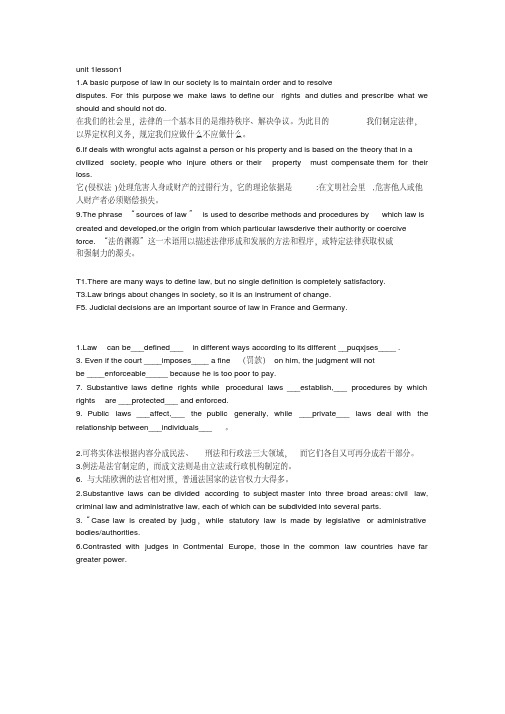
unit 1lesson11.A basic purpose of law in our society is to maintain order and to resolvedisputes. For this purpose we make laws to define our rights and duties and prescribe what we should and should not do.在我们的社会里,法律的一个基本目的是维持秩序、解决争议。
为此目的我们制定法律,以界定权利义务,规定我们应做什么不应做什么。
6.If deals with wrongful acts against a person or his property and is based on the theory that in a civilized society, people who injure others or their property must compensate them for their loss.它(侵权法)处理危害人身或财产的过错行为,它的理论依据是:在文明社会里,危害他人或他人财产者必须赔偿损失。
9.The phrase “sources of law”is used to describe methods and procedures by which law is created and developed,or the origin from which particular lawsderive their authority or coercive force. “法的渊源”这一术语用以描述法律形成和发展的方法和程序,或特定法律获取权威和强制力的源头。
T1.There are many ways to define law, but no single definition is completely satisfactory.w brings about changes in society, so it is an instrument of change.F5. Judicial decisions are an important source of law in France and Germany.w can be___defined___ in different ways according to its different __puqxjses____ .3. Even if the court ____imposes____ a fine (罚款)on him, the judgment will notbe ____enforceable_____ because he is too poor to pay.7. Substantive laws define rights while procedural laws ___establish,___ procedures by which rights are ___protected___ and enforced.9. Public laws ___affect,___ the public generally, while ___private___ laws deal with the relationship between___individuals___ 。
法律英语期末考试部分总结(仅供参考)
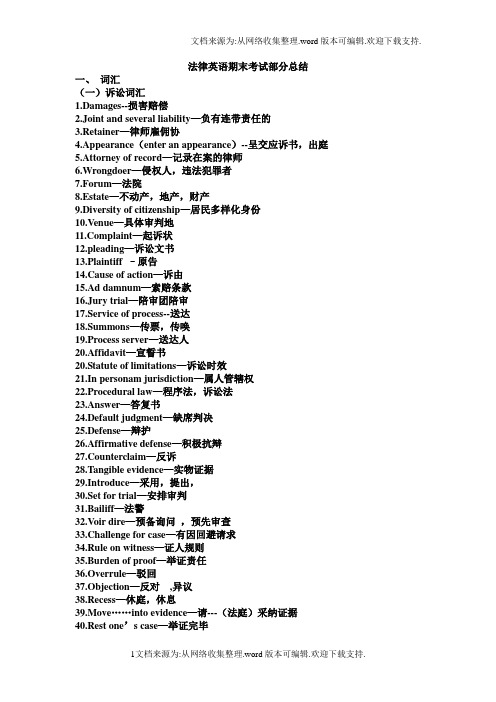
法律英语期末考试部分总结一、词汇(一)诉讼词汇1.Damages--损害赔偿2.Joint and several liability—负有连带责任的3.Retainer—律师雇佣协4.Appearance(enter an appearance)--呈交应诉书,出庭5.Attorney of record—记录在案的律师6.Wrongdoer—侵权人,违法犯罪者7.Forum—法院8.Estate—不动产,地产,财产9.Diversity of citizenship—居民多样化身份10.Venue—具体审判地plaint—起诉状12.pleading—诉讼文书13.Plaintiff –原告14.Cause of action—诉由15.Ad damnum—索赔条款16.Jury trial—陪审团陪审17.Service of process--送达18.Summons—传票,传唤19.Process server—送达人20.Affidavit—宣誓书20.Statute of limitations—诉讼时效21.In personam jurisdiction—属人管辖权22.Procedural law—程序法,诉讼法23.Answer—答复书24.Default judgment—缺席判决25.Defense—辩护26.Affirmative defense—积极抗辩27.Counterclaim—反诉28.Tangible evidence—实物证据29.Introduce—采用,提出,30.Set for trial—安排审判31.Bailiff—法警32.Voir dire—预备询问,预先审查33.Challenge for case—有因回避请求34.Rule on witness—证人规则35.Burden of proof—举证责任36.Overrule—驳回37.Objection—反对,异议38.Recess—休庭,休息39.Move……into evidence—请---(法庭)采纳证据40.Rest one’s case—举证完毕41.Adjourn—休庭42.Directed verdict—直接裁决43.Take……under advisement—搁置44.Standard of proof—举证规则45.Closing argument—终结辩论46.Judgment—判决47.Appeal—上诉48.Stay—中止执行49.Notice of appeal—上诉通知书50.Bond—债51.Res judicata—一事不再理原则52.Appellant—上诉人53.Appellee—被上诉人54.Brief—上诉状55. Opinion—意见书56.Affirm—维持57.En banc—全席听审58.Prosecution--,(刑事)检控59.Indictment—公诉书60.Arraignment—提审,控告(二)笔记中词汇1.false imprisonment—非法拘禁2.null and void—无效的3.lodging suit –提起诉讼4.The Intermediate People’s Court—中级人民法院5.unjustly enriched—不当得利6.Pecuniary loss—经济损失7.cause of action—诉由8.Patent infringement action—专利侵权诉讼9.subpoena—传票10.Good Faith Clause—诚实信用条款11.principal offender—首要罪犯12.accomplice under duress—胁从犯13.quid pro quo—对价交换14.valid consent—有效允诺15.justice delayed is justice denied---迟到正义不是正义16.party in breach—违约方17incidental damages—附带损失18.loss of profit—利润损失二、句子改错(一)使用实意动词,减少be动词的使用。
法律英语教程(宋雷著)中文译本
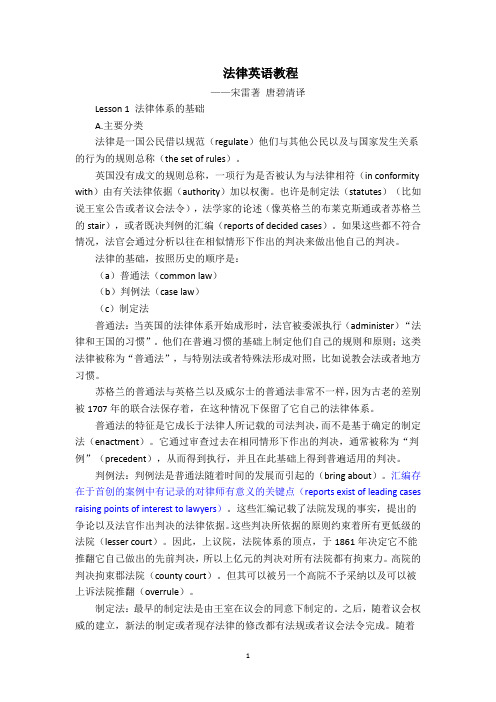
法律英语教程——宋雷著唐碧清译Lesson 1 法律体系的基础A.主要分类法律是一国公民借以规范(regulate)他们与其他公民以及与国家发生关系的行为的规则总称(the set of rules)。
英国没有成文的规则总称,一项行为是否被认为与法律相符(in conformity with)由有关法律依据(authority)加以权衡。
也许是制定法(statutes)(比如说王室公告或者议会法令),法学家的论述(像英格兰的布莱克斯通或者苏格兰的stair),或者既决判例的汇编(reports of decided cases)。
如果这些都不符合情况,法官会通过分析以往在相似情形下作出的判决来做出他自己的判决。
法律的基础,按照历史的顺序是:(a)普通法(common law)(b)判例法(case law)(c)制定法普通法:当英国的法律体系开始成形时,法官被委派执行(administer)“法律和王国的习惯”。
他们在普遍习惯的基础上制定他们自己的规则和原则;这类法律被称为“普通法”,与特别法或者特殊法形成对照,比如说教会法或者地方习惯。
苏格兰的普通法与英格兰以及威尔士的普通法非常不一样,因为古老的差别被1707年的联合法保存着,在这种情况下保留了它自己的法律体系。
普通法的特征是它成长于法律人所记载的司法判决,而不是基于确定的制定法(enactment)。
它通过审查过去在相同情形下作出的判决,通常被称为“判例”(precedent),从而得到执行,并且在此基础上得到普遍适用的判决。
判例法:判例法是普通法随着时间的发展而引起的(bring about)。
汇编存在于首创的案例中有记录的对律师有意义的关键点(reports exist of leading cases raising points of interest to lawyers)。
这些汇编记载了法院发现的事实,提出的争论以及法官作出判决的法律依据。
大学法律英语综合教程重中之重
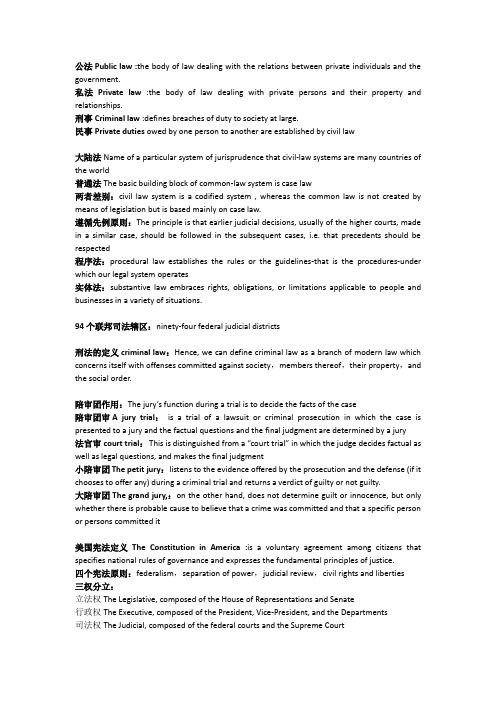
公法Public law :the body of law dealing with the relations between private individuals and the government.私法Private law:the body of law dealing with private persons and their property and relationships.刑事Criminal law :defines breaches of duty to society at large.民事Private duties owed by one person to another are established by civil law大陆法Name of a particularsystem of jurisprudence that civil-law systems are many countries of the world普通法The basic building block of common-law system is case law两者差别:civil law system is a codified system , whereas the common law is not created by means of legislation but is based mainly on case law.遵循先例原则:The principle is that earlier judicial decisions, usually of the higher courts, made in a similar case, should be followed in the subsequent cases, i.e. that precedents should be respected程序法:procedural law establishes the rules or the guidelines-that is the procedures-under which our legal system operates实体法:substantive law embraces rights, obligations, or limitations applicable to people and businesses in a variety of situations.94个联邦司法辖区:ninety-four federal judicial districts刑法的定义criminal law:Hence, we can define criminal law as a branch of modern law which concerns itself with offenses committed against society,members thereof,their property,and the social order.陪审团作用:The jury’s function during a trial is to decide the facts of the case陪审团审A jury trial:is a trial of a lawsuit or criminal prosecution in which the case is presented to a jury and the factual questions and the final judgment are determined by a jury法官审court trial:This is distinguished from a “court trial” in which the judge decides factual as well as legal questions, and makes the final judgment小陪审团The petit jury:listens to the evidence offered by the prosecution and the defense (if it chooses to offer any) during a criminal trial and returns a verdict of guilty or not guilty.大陪审团The grand jury,:on the other hand, does not determine guilt or innocence, but only whether there is probable cause to believe that a crime was committed and that a specific person or persons committed it美国宪法定义The Constitution in America :is a voluntary agreement among citizens that specifies national rules of governance and expresses the fundamental principles of justice.四个宪法原则:federalism,separation of power,judicial review,civil rights and liberties三权分立:立法权The Legislative, composed of the House of Representations and Senate行政权The Executive, composed of the President, Vice-President, and the Departments司法权The Judicial, composed of the federal courts and the Supreme Court司法审查Judicial review:is the power and duty vested in the U. S. Supreme Court to declare null and voidany statute or act of the federal government or of any state government that violates the U. S. Constitution.司法审查的由来麦迪逊案:What judicial review meant, however, was not articulated until 1803, in case of Marbury v. Madison.This case did more than validate (i.e., give legal force to) the judicial review of legislative and executive enactments and orders.刑法定义criminal law :as a branch of modern law which concerns itself with offenses committed against society,members thereof,their property,and the social order.四种犯罪意图:The Model Penal Code defines four mental states that apply to the commission of crimes: (1) intent (or purpose) to perform the act or cause the result, (2) knowledge of the act’s nature or outcome, (3) recklessness, and (4) negligence正当理由Justifications:Self-defense正当防卫Defense of others我他防卫Defense of home and property家庭财产Necessity紧急避险ConsentResisting unlawful arrest抵制非法逮捕可宽恕的excuses:Duress强迫Age年龄Mistake过失Involuntary intoxication非自愿Unconsciousness无意识Provocation怒Insanity精神病Diminished capacity责任减免。
法律英语核心教程 (第一册)unit-11
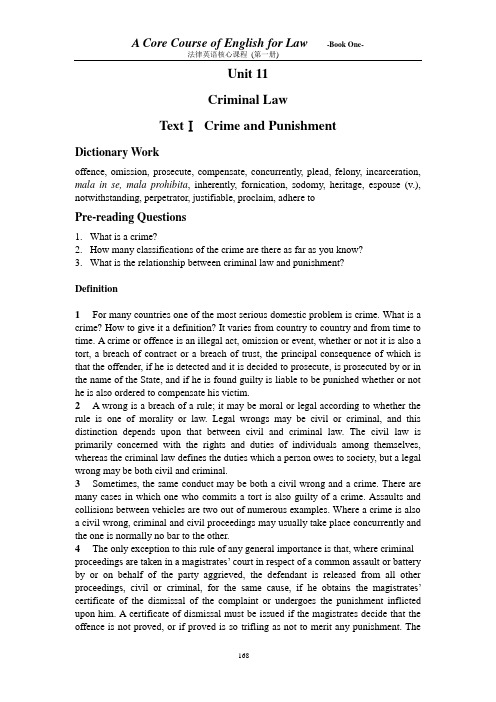
Unit 11Criminal LawTextⅠCrime and PunishmentDictionary Workoffence, omission, prosecute, compensate, concurrently, plead, felony, incarceration, mala in se, mala prohibita, inherently, fornication, sodomy, heritage, espouse (v.), notwithstanding, perpetrator, justifiable, proclaim, adhere toPre-reading Questions1.What is a crime?2.How many classifications of the crime are there as far as you know?3.What is the relationship between criminal law and punishment?Definition1For many countries one of the most serious domestic problem is crime. What is a crime? How to give it a definition?It varies from country to country and from time to time. A crime or offence is an illegal act, omission or event, whether or not it is also a tort, a breach of contract or a breach of trust, the principal consequence of which is that the offender, if he is detected and it is decided to prosecute, is prosecuted by or in the name of the State, and if he is found guilty is liable to be punished whether or not he is also ordered to compensate his victim.2 A wrong is a breach of a rule; it may be moral or legal according to whether the rule is one of morality or law. Legal wrongs may be civil or criminal, and this distinction depends upon that between civil and criminal law. The civil law is primarily concerned with the rights and duties of individuals among themselves, whereas the criminal law defines the duties which a person owes to society, but a legal wrong may be both civil and criminal.3Sometimes, the same conduct may be both a civil wrong and a crime. There are many cases in which one who commits a tort is also guilty of a crime. Assaults and collisions between vehicles are two out of numerous examples. Where a crime is also a civil wrong, criminal and civil proceedings may usually take place concurrently and the one is normally no bar to the other.4The only exception to this rule of any general importance is that, where criminal proceedings are taken in a magistrates’ court in respect of a common assault or battery by or on behalf of the party aggrieved, the defendant is released from all other proceedings, civil or criminal, for the same cause, if he obtains the magistrates’ certificate of the dismissal of the complaint or undergoes the punishment inflicted upon him. A certificate of dismissal must be issued if the magistrates decide that the offence is not proved, or if proved is so trifling as not to merit any punishment. Thepower to dismiss a case even though the offence is proved, which is peculiar to the above off ences, depends on there having been a hearing “on the merits” and this will not have occurred if the accused pleaded guilty.Criminal Law Classifications5Criminal law classifies crimes according to various criteria, including (1) the nature and degree of p enalty attached, (2) the nature and degree of “evil” involved, and (3) the kind of social harm.Felony, Misdemeanor, and Violation6 The past influences present criminal law. The great legal historian Frederic William Maitland maintained that the reasons for old classifications may have long since died, but their ghost ruel us from the grave. He meant that even when classifications have outlived their usefulness, they influence present practice. The classification that divides crimes into felonies and misdemeanors represents one example of the past ruling us from the grave. Historically, felonies were crimes punishable by death. Present law divides felonies into capital felonies and ordinary felonies. Therefore, the category includes both serial killers such as Ted Bundy at one extreme and individuals who steal £500 at the other. The breadth of its scope makes the classification largely meaningless in any sociological sense. It serves mainly as an administrative device to determine who gets the death penalty, life imprisonment, or incarceration in a state prison.7 Misdemeanors include crimes punishable either by fines or up to one year in jail. Common misdemeanors include simple assaults and battery, prostitution, and disorderly conduct. Most jurisdictions divide misdemeanors into gross misdemeanors.A third category of crime is violation. Traffic offenses fall into this group..Mala in se and Mala Prohibita8Another legal classification sorts crimes according to their perceived “evil.” This old arrangement overlaps the felony, misdemeanor, and violation categories and defines some crimes as inherently bad (the Latin mala in se). Crimes such as murder and rape fall into this category. Other behavior constitutes a crime only because the law says so (the Latin mala prohibita). Parking in a “no parking” zone is malum prohibitum.9This classification reflects American criminal law’s roots in the religious and moral codes of England and colonial America. Although frequently viewed as a preoccupation of the New England Puritans, the Anglicans of Virginia, Pennsylvania Quakers, and Maryland Catholics also infused criminal law with a moral component. The major felonies and “morals” offenses, fornication, prostitution, sodomy, gambling, and public drunkenness, descend from this religious and moral heritage.10In practice, no bright line separates mala in se and mala prohibita offenses. In fact, research demonstrates that despite legal theories espousing the distinction, and notwithstanding talk of an ethical core in the criminal law, perpetrators consider manycrimes formally classified mala in se “justifiable”-that is, a means to put right a keenly felt wrong. They believe their conduct may have been “technically” a crime, but definitely not evil. Despite these findings, legal theorists cling to the distinction.Crime, Law and Punishment11 “N o crime without law and no punishment without law” proclaim two ancient maxims governing formal criminal justice. Formally, modern criminal law adheres to these maxims in the firmly fixed principle of legality that underlies the substantive criminal law, that is, the law that defines what constitutes a crime. The principle of legality also applies to the law of criminal procedure, the law that prescribes how the government enforces the substantive criminal law, in such constitutional commands as “no deprivation of life, liberty, or property without due process of law” and the guarantee of equal protection of the laws.12In practice, much reprehensible conduct, some of which causes considerable harm, occurs in every society. Neither all of that conduct nor all of that harm constitutes a crime. The law determines the distinction between unethical, immoral injury that justifies non-criminal legal action and criminal conduct and harm. To qualify as crimes, conduct or harm must satisfy five requirements; (1) A specific law prohibits the conduct and/or harm. (2) The law prescribes a penalty for the prohibited conduct and/or harm. (3) The particular law conforms to the general purposes and principles of criminal law. (4) The government must adhere to the rules of procedure in administering and enforcing the criminal law. (5) The punishment prescribed and actually administered accords with the Constitution’s prohibition against cruel an d unusual punishment.(1089words) Cross Jones &Card, Introduction to Criminal Law, 11th edition, Butterworth & Co (Publishers) Ltd.; Joel Samaha, Criminal Justice, 2nd edition, West Publishing CompanyNotes_________________________1.capital felony: Crime punishable by death or life imprisonment.可判死刑或终生监禁的重罪。
法律英语基础:了解法律相关的英语知识

06
法律英语的实际应用与案
例分析
法律英语在律师工作中的应用
• 律师工作中的法律英语应用
• 阅读和理解法律文件
• 撰写法律文件和信函
• 参加国际法律会议和谈判
法律英语在法官工作中的应用
• 法官工作中的法律英语应用
• 阅读和理解法律文件
• 撰写判决和裁定
• 参加国际法律会议和研讨
法律英语在法学教育
• 使用专业术语和短语
• "In order to..."句型:表示目的和意图
• 使用被动语态和长句表达
03
法律英语的阅读与翻译技
巧
法律英语的阅读策略与方法
法律英语阅读的重要性
• 了解国际法律规则和案例
• 提高法律英语水平
法律英语阅读策略
• 快速阅读:了解文章大意和结构
• 细致阅读:理解法律条款和案例细节
• 批判性阅读:分析和评价法律观点和信息
法律英语的翻译原则与技巧
01
法律英语翻译的重要性
• 促进国际法律交流和合作
• 提高法律英语水平
02
法律英语翻译原则
• 准确性:确保翻译内容忠实于原文
• 严谨性:使用正式和严谨的语言表达
• 通顺性:使翻译后的文章易于理解和阅读
03
法律英语翻译技巧
• 使用专业术语和短语
CREATE TOGETHER
DOCS SMART CREATE
法律英语基础:了解法律相关的英语知识
DOCS
01
法律英语的基本概念与特
点
法律英语的起源与发展
法律英语起源于19世纪
• 英国的普通法体系逐渐形成
• 英国对全球法律体系的影响
LEC第五章法律英语综合教程翻译
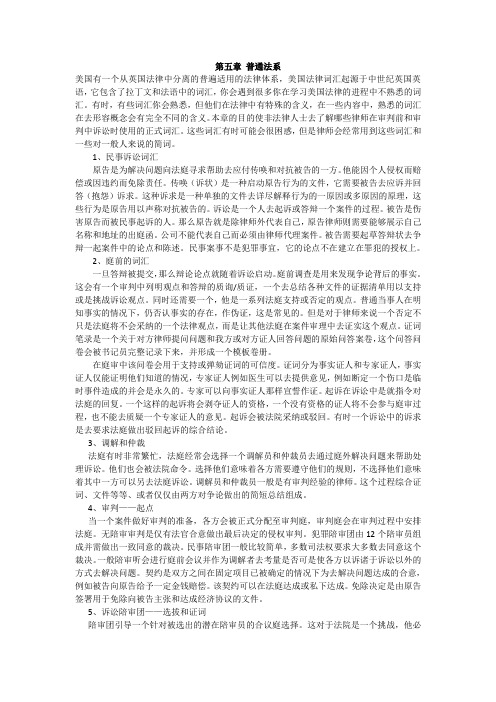
第五章普通法系美国有一个从英国法律中分离的普遍适用的法律体系,美国法律词汇起源于中世纪英国英语,它包含了拉丁文和法语中的词汇,你会遇到很多你在学习美国法律的进程中不熟悉的词汇。
有时,有些词汇你会熟悉,但他们在法律中有特殊的含义,在一些内容中,熟悉的词汇在去形容概念会有完全不同的含义。
本章的目的使非法律人士去了解哪些律师在审判前和审判中诉讼时使用的正式词汇。
这些词汇有时可能会很困惑,但是律师会经常用到这些词汇和一些对一般人来说的简词。
1、民事诉讼词汇原告是为解决问题向法庭寻求帮助去应付传唤和对抗被告的一方。
他能因个人侵权而赔偿或因违约而免除责任。
传唤(诉状)是一种启动原告行为的文件,它需要被告去应诉并回答(抱怨)诉求。
这种诉求是一种单独的文件去详尽解释行为的一原因或多原因的原理,这些行为是原告用以声称对抗被告的。
诉讼是一个人去起诉或答辩一个案件的过程。
被告是伤害原告而被民事起诉的人。
那么原告就是除律师外代表自己,原告律师则需要能够展示自己名称和地址的出庭函。
公司不能代表自己而必须由律师代理案件。
被告需要起草答辩状去争辩一起案件中的论点和陈述。
民事案事不是犯罪事宜,它的论点不在建立在罪犯的授权上。
2、庭前的词汇一旦答辩被提交,那么辩论论点就随着诉讼启动。
庭前调查是用来发现争论背后的事实。
这会有一个审判中列明观点和答辩的质询/质证,一个去总结各种文件的证据清单用以支持或是挑战诉讼观点。
同时还需要一个,他是一系列法庭支持或否定的观点。
普通当事人在明知事实的情况下,仍否认事实的存在,作伪证,这是常见的。
但是对于律师来说一个否定不只是法庭将不会采纳的一个法律观点,而是让其他法庭在案件审理中去证实这个观点。
证词笔录是一个关于对方律师提问问题和我方或对方证人回答问题的原始问答案卷,这个问答问卷会被书记员完整记录下来,并形成一个模板卷册。
在庭审中该问卷会用于支持或弹劾证词的可信度。
证词分为事实证人和专家证人,事实证人仅能证明他们知道的情况,专家证人例如医生可以去提供意见,例如断定一个伤口是临时事件造成的并会是永久的。
- 1、下载文档前请自行甄别文档内容的完整性,平台不提供额外的编辑、内容补充、找答案等附加服务。
- 2、"仅部分预览"的文档,不可在线预览部分如存在完整性等问题,可反馈申请退款(可完整预览的文档不适用该条件!)。
- 3、如文档侵犯您的权益,请联系客服反馈,我们会尽快为您处理(人工客服工作时间:9:00-18:30)。
●法律的分类:A.Public law and private lawPublic law: constitutional law, criminal law and administrative law (行政法)Private law: contract law commercial law tort law property law…B.Criminal law and Civil lawC.Civil law (大陆法) and Common Law(普通法)大陆法的重要特点是强调成文法的作用。
成文法(written law)又称为制定法(statute)Common law(case law):following the principle of stare decisis 遵循先例●Goddess of law:希腊:TemisRoman:Justitia词汇:administrative agency 行政机关prosecutor 检察官Damages:损害赔偿金punitive/exemplary damages 惩戒性损害赔偿金Lawsuit 诉讼(尤指非刑事案件)institue a lawsuit 提起法律诉讼Miranda waningsStatue of limitations诉讼时效是指民事权利受到侵害的权利人在法定的时效期间内不行使权利,当时效期间届满时,人民法院对权利人的权利不再进行保护的制度。
●Source of law:Constitutions and common law (common law) and statutory law and administrative law statutory law (legislation): 制定法(立法)制定法是由国家享有立法权的机关依照法定程序制定和公布的法律。
●Chinese Court system:中国的人民法院的组织体系分为四级,即设基层、中级、高级和最高人民法院,并设军事、铁路、水运等专门人民法院。
中国的基层人民法院包括县人民法院和市人民法院、自治县人民法院和市辖区的人民法院;中级人民法院包括:省、自治区内按地区设立的中级人民法院,直辖市内设立的中级人民法院,省、自治区辖市的中级人民法院和自治州人民法院;高级人民法院包括省高级人民法院、自治区高级人民法院和直辖市高级人民法院。
专门人民法院包括军事法院、海事法院、铁路运输法院、森林法院、农垦法院、石油法院等。
最高人民法院:the Supreme People's Court专门人民法院:special people's court●美国法院系统US Court system分为联邦和各州两大系统:Federal and state court system1.联邦系统法院包括:Federal court system1.联邦地方法院district court (普通民事,刑事案件的初审法院),2.联邦上诉法院United States Court of Appeals3.美国最高法院the Supreme Court (全国最高审级由总统征得参议院同意后任命的9名终身法官组成,其判例对全国有拘束力,享有特殊司法审查权),4.专门法院special court2.州系统法院包括:1.初审法院:trial court (州管辖的一般民事,刑事案件的初审法院),2.州上诉法院appellate court3.州最高法院state supreme court (州的最高审级)。
●陪审团Jury目前于司法制度中采用陪审团制度的有美国、英国和香港等。
陪审团所认定的结果在英美法上称为verdict陪审员juror 陪审团长foreperson悬而不决的陪审团;未能作出裁定的陪审团hung jury 所谓陪审团制度,是指特定人数的有选举权的公民参与决定是否起诉嫌犯、并对案件作出判决的制度。
陪审团分为大陪审团和小陪审团。
大陪审团只适用于刑事案件,由23人组成,其主要职责是决定是否起诉,可以在任期内(一般4周)审理若干起案子;而小陪审团则参加审判,决定被告人是否有罪,而在民事诉讼中则是决定被告人是否要赔偿。
小陪审团一般由6-12人组成,一案一组。
●主要法理学流派实证法或实在法positive law 自然法natural law“应然法”,就是“应该是怎么样的法”(law as it ought to be),即根据其自身的特性而应达到某种理想状态的法。
而实然法是指法在当下已经实际发生、现实存在的状态。
就是“实际上是怎么样的法”(law as it is),即在现实中实际存在、实际发生效力、对人们的行为实际产生作用的法。
“应然法”问题是“法应该怎么样”的问题,它涉及的是人们对法应该达到的理想状态的价值判断,是法存在的终极理由的评论,是对法之好坏善恶的评价。
通俗点说“应然法”是法的一种理想状态,而“实然法”是根据社会经济条件所制定出的法,这种法在某些方面可能并不体现人们的正义观。
●Criminal Law(刑法)刑事案件(criminal case)中的犯法叫做crime,民事案件(civil case)中犯的法叫做民事过错(civil wrong),不叫crime在刑法的刑事诉讼(criminal proceedings)中,原告是社会或是国家,而非个人,而在民事诉讼civil action中,原告是个人,称为plaintiff英国的普通法把crime分为两大类:重罪(felonies)和轻罪(misdemeanors)一般的,引起刑事诉讼的犯罪行为包括:1.Felonious homicide重罪杀人、恶意杀人,这项罪行包括两种,即murder和manslaughterMurder:蓄意谋杀Manslaughter:非预谋谋杀罪2.Arson3.mayhem 重伤罪4. rape5. robbery6. sodomy 反自然性行为承担刑事责任的基础:犯罪行为criminal act和犯罪心理mental element,两者缺一不可犯罪行为(Criminal Act):1.不作为failure to act不作为是相对于作为而言的,指行为人负有实施某种积极行为的特定的法律义务,并且能够实行而不实行的行为。
2.替代责任vicarious liability:被告人对他人的不正当行为承担责任,这一问题常出现在雇佣情况下刑事审判原则:Criminal defendants are presumed innocent.●刑事指控被告人的辩护类型types of defenses to a Criminal charge美国法律制度中有下列四类抗辩理由:1.不再犯罪现场Alibi:2.正当理由:justifications, 这个类型分为以下几种:Self-defense自我防卫;the defense of others他我防卫;defense of home and property 家庭与财产防卫;necessity紧急避险;consent 被害人同意resisting unlawful arrest 抗拒非法拘捕3.可得宽恕:包括被强迫,年龄不足,非自愿醉态,无意识,精神病等等非自愿醉态:Involuntary intoxication4.程序不正当:●刑事诉讼中被告人的权利:1.保持沉默的权利the right to remain silent2.对质证人的权利:to confront witness3.获得公开审判:right to a public trial4.获得陪审团:right to jury:注:a lack of unanimity among the jurors is called a hungjury, and the defendant will go free unless the prosecutor decides to retry the case.5.获得律师辩护权:the right to be represented by an attorney6.被告人享有不受双重追诉的权利:not to be placed in double jeopardydouble jeopardy一罪不受两次审理原则;Miranda Warnings(米兰达警告)You have the right to remain silent and refuse to answer questions.Anything you do say may be used against you in a court of law.You have the right to consult an attorney before speaking to the police and to have an attorney present during questioning now or in the future.If you cannot afford an attorney, one will be appointed for you before any questioning if you wish.If you decide to answer questions now without an attorney present you will still have the right to stop answering at any time until you talk to an attorney.Knowing and understanding your rights as I have explained them to you, are you willing to answer my questions without an attorney present?中文翻译“宪法要求我告知你以下权利:1.你有权保持沉默,你对任何一个警察所说的一切都将可能被作为法庭对你不利的证据。
2.你有权利在接受警察询问之前委托律师,他(她)可以陪伴你受讯问的全过程。
美国法典3.如果你付不起律师费,只要你愿意,在所有询问之前将免费为你提供一名律师。
4.如果你不愿意回答问题,你在任何时间都可以终止谈话。
如果你希望跟你对律师谈话,你可以在任何时间停止回答问题,并且你可以让律师一直伴随你询问的全过程。
”●民事诉讼法Law of Civil Procedure民事诉讼法是调整民事诉讼civil action的法律规范,是指国家制定或认可的,规范法院和当事人、其他诉讼参与人进行诉讼活动的法律规范的总和。
